
HIGHEST-PAID FOOTBALL COACHES IN THE WORLD 2023
Steven Gerrard displaces Zidane in Highest-paid Football coaches in the world 2023 [UPDATED]
Football coaches are the primary brain behind every team’s success in football as far as trophies are concerned. In this article, we will be reviewing the list of highest-paid coaches in world football in 2023.
Football managers work in a highly stressful environment, but their efforts has seen them rewarded accordingly, with some boasting wages that place them amongst the highest-paid coaches in the world.
The highest-paid coaches in the world basically earn annual salaries in the millions of dollars.
They are frequently contracted by high-profile, and respected clubs or teams and are also subject to certain to strict terms and conditions.
These coaches are tasked with the responsibility of establishing team standards and facilitating victories on the pitch.
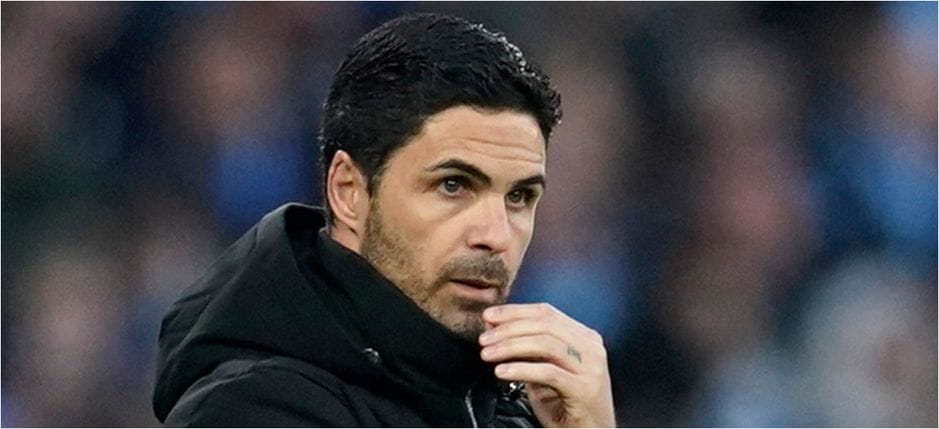
Mikel Arteta is one of the highest-paid coaches in world football in 2023
They are also responsible for harnessing the potentials of young players at the club and most times have a major say in recruiting players that will strengthen the club’s squad depth.
Even when they are sacked, they still earn enormous amounts to the tune of millions.
For instance, AS Roma coach, Jose Mourinho has reportedly totalled more than £97 million/$115 million for all the times he has been fired during his incredible managerial career – such are the perks that come with being a world-class football manager.
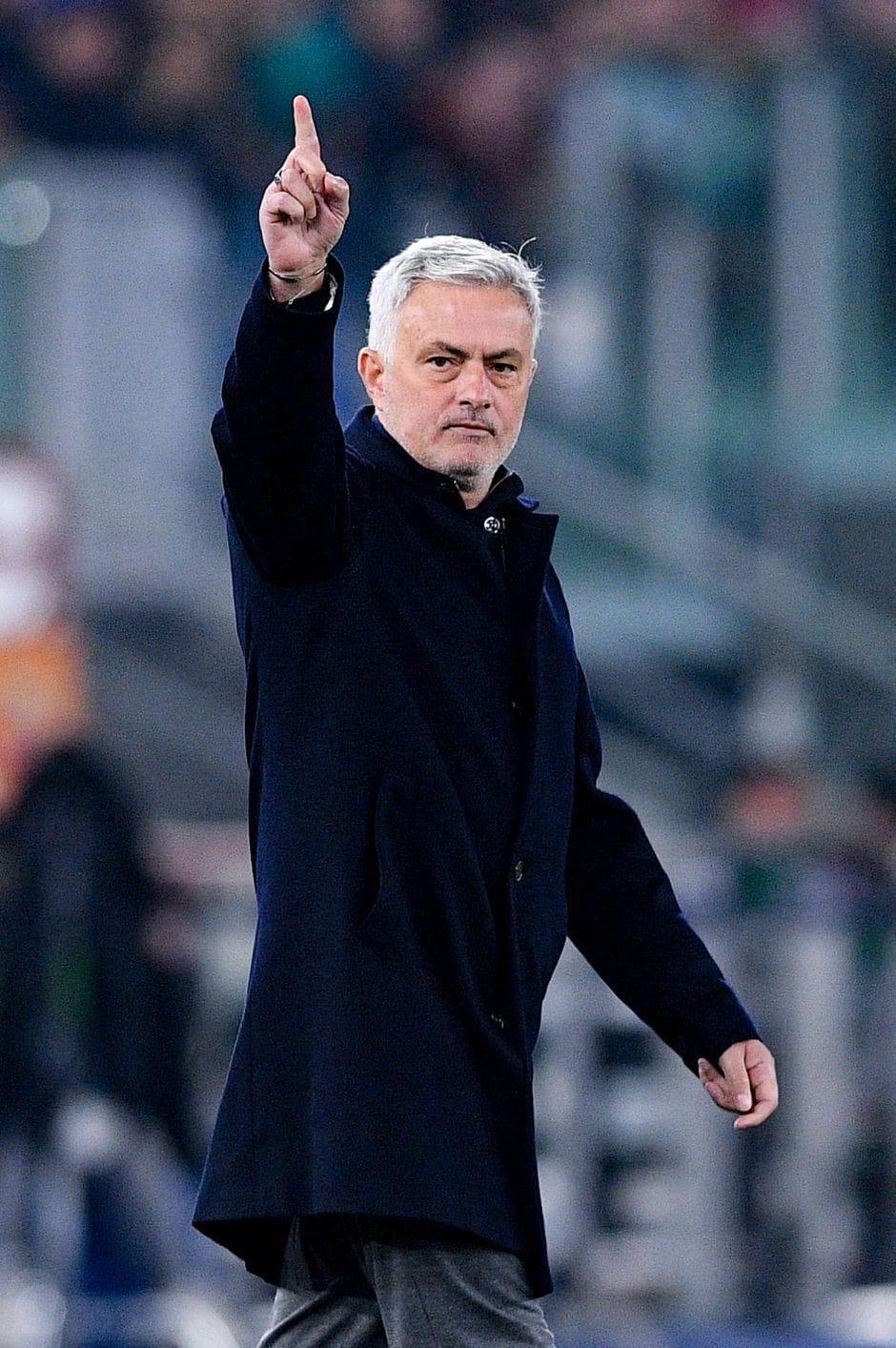
Jose Mourinho is one of the highest-paid football managers in the world in 2023
In this article, we will be reviewing the top 11 highest-paid coaches in world football as of 2023 via figures from Paywizard as well as Marca.
Highest-paid football coaches in the world right now
11. Jose Mourinho (AS Roma) – $7.4 million p/a
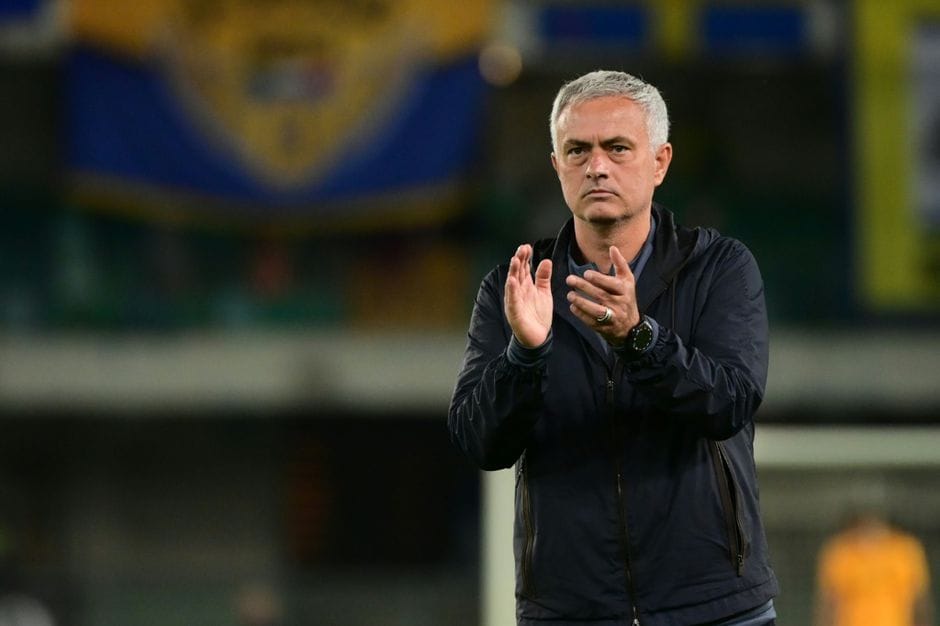
Jose Mourinho is one of the highest-paid football managers in the world
José Mário dos Santos Mourinho Félix popularly known as Jose Mourinho is a 60-year-old Portuguese professional football manager and former player who is the current head coach of Italian Serie A club Roma.
Jose Mourinho is also one of the highest-paid football coaches in the world in 2023.
Dubbed “The Special One” by the British media, Mourinho is one of the most decorated managers ever and is widely considered to be among the greatest soccer managers of all time.
After an uneventful career as a midfielder in the Portuguese leagues, Mourinho moved into coaching, first as an interpreter for Sir Bobby Robson at Sporting CP and Porto, before gaining success as an assistant at Barcelona under both Robson and his successor, Louis van Gaal.
After brief stints at Benfica and União de Leiria, Mourinho returned to Porto as manager in 2002, winning the Primeira Liga twice, a Taça de Portugal, the UEFA Cup and the UEFA Champions League, Porto’s first European Cup title since 1987.

Mourinho announced himself on the big stage with a Champions League title at Porto
Mourinho’s success in Portugal earned him a move to England with Chelsea in 2004.
Marked by braggadocio during his early managerial career, Mourinho famously said “I think I’m a special one”, which came to be a renowned moniker for him.
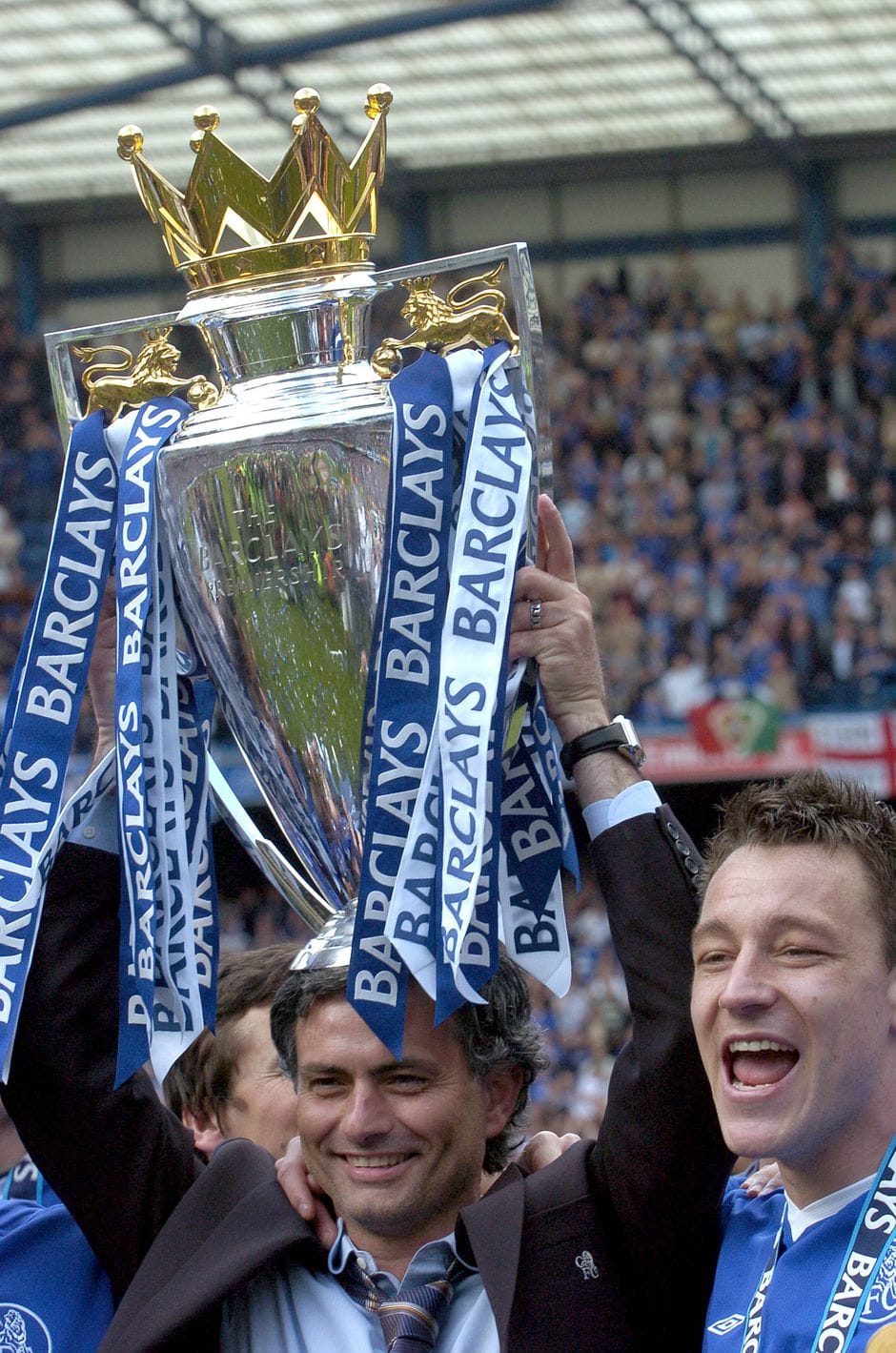
Jose Mourinho was successful in his first stint with Chelsea after arriving in 2004
With Chelsea, he won two Premier League titles, an FA Cup and two League Cups in his three seasons at the club, before he departed in 2007 amid reports of disagreements with club owner Roman Abramovich.
In 2008, Mourinho joined Italian club Inter Milan, where he won Serie A twice, including a European treble of Serie A, the Coppa Italia and the UEFA Champions League in 2010, a first for an Italian club.
This made him one of five coaches to have won the European Cup with two clubs, and later that year, earned him the first FIFA World Coach of the Year Award.
Mourinho then moved to Real Madrid in Spain, where he won La Liga in 2011–12 with a record points tally, becoming the fifth coach to have won league titles in four countries.
In Madrid, he also won a Copa del Rey and a Supercopa de España.
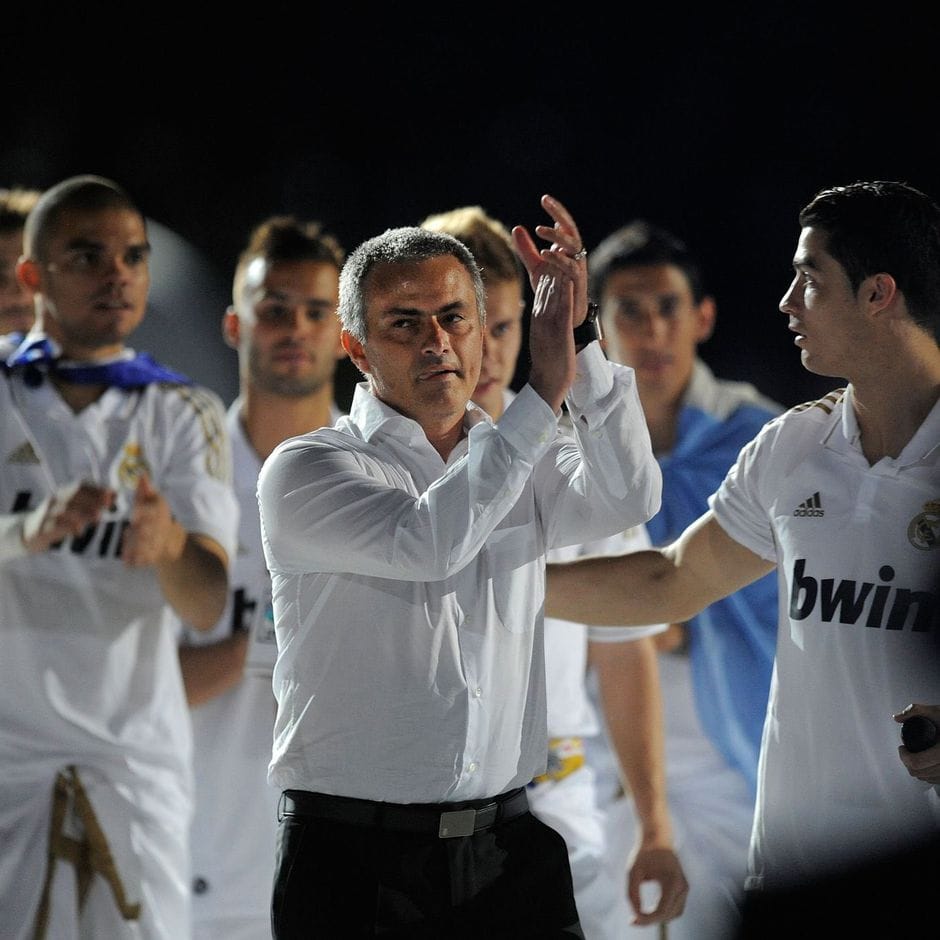
Jose Mourinho won LaLiga with Real Madrid in 2012
Mourinho left Real Madrid in 2013 and rejoined Chelsea, where he won another league title and League Cup, but was dismissed in 2015 after a poor run of results.
Fiollowing his Chelsea exit, Mourinho remained in England, and was appointed at Manchester United and Tottenham Hotspur respectively, but his tenure at both clubs were relatively short-lived and ended acrimoniously.
Despite this, Mourinho won the UEFA Europa League, League Cup and FA Community Shield in his first season with Manchester United, and led Tottenham to the final of the League Cup.
He was soon hired by Serie A club AS
Roma and won the inaugural UEFA Europa Conference League, becoming first manager to win a major European competition with four clubs and the third manager to win the three main UEFA club competitions.
In 2015, Mourinho was named Portuguese Coach of the Century by the Portuguese Football Federation (FPF), and was the first coach to spend more than £1 billion on transfers.
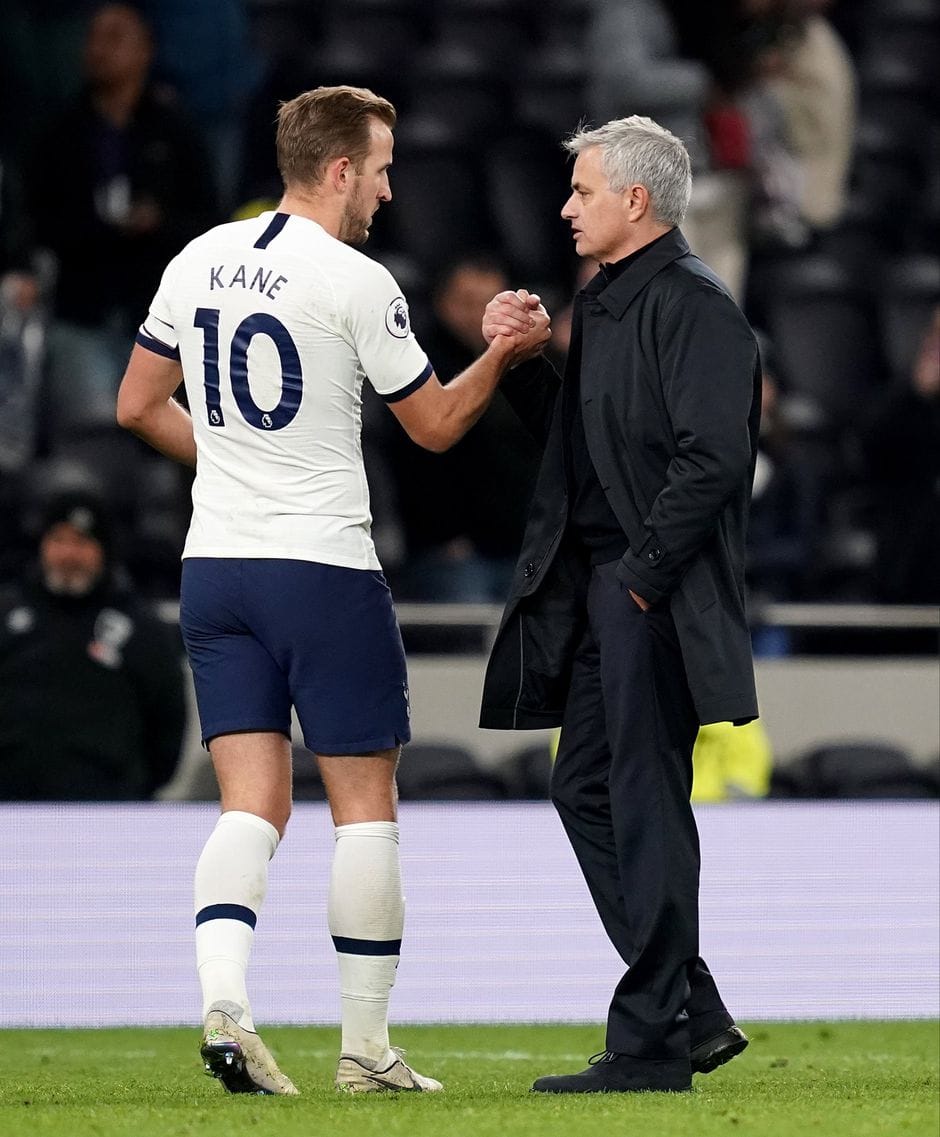
Mourinho endured a torrid spell with Tottenham Hotspur
Due to his tactical knowledge, charismatic and controversial personality, and a reputation for prioritising results over attractive football, he has been widely praised by critics and supporters for the majority of his career.
Jose Mourinho Coaching Style
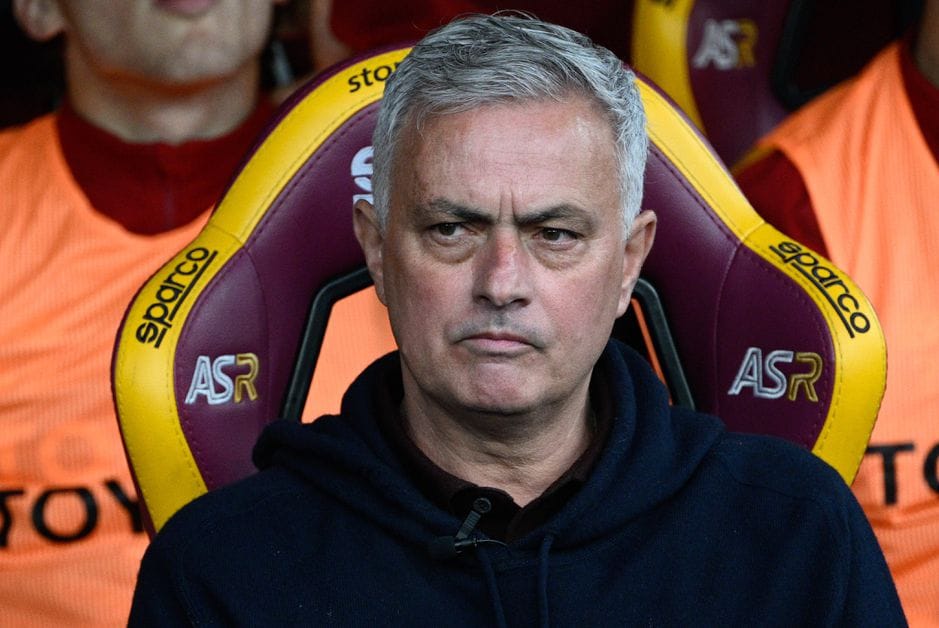
Roma’s manager Jose Mourinho
Mourinho has been noted for his tactical prowess, game management,and adaptability to different situations.
Teams under Mourinho’s management typically demonstrate great defensive awareness as well as a quick transition ability with the ball through midfield, in particular down the flanks.
A common feature of his teams is playing with three or more central midfielders, as Mourinho has stressed midfield superiority as crucial in winning games.
As a Porto manager, Mourinho employed a diamond 4–4–2 formation, with his midfield – consisting of Costinha or Pedro Mendes as defensive midfielder; Maniche and Dmitri Alenichev as wide central midfielders; and Deco on the tip – acting as a cohesive unit rather than a collection of individuals, providing Porto with midfield superiority while allowing the full-backs to get forward as much as possible.
During his first two years at Chelsea, Mourinho employed a fluid 4–3–3 formation, having Claude Makélélé play the role of deep-lying midfielder.
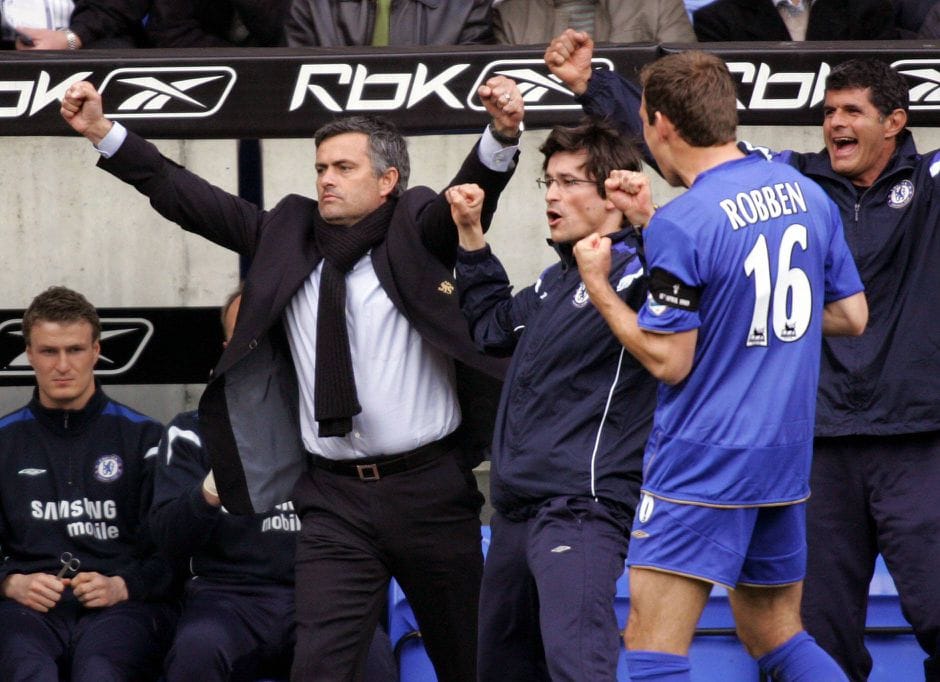
Mourinho reportedly wants to re-live the glory days at Stamford Bridge (Geoff Martin)
This tactic gave Chelsea a three-against-two midfield advantage over most English teams playing 4–4–2 at the time, and helped Chelsea win Premier League titles in 2004–05 and 2005–06.
Andrei Shevchenko’s signing at Chelsea forced Mourinho to switch to a 4–1–3–2 for the 2006–07 season.
At Inter, he won his first Serie A title alternating between a 4–3–3 and a diamond, and in his second season, the signings of Samuel Eto’o, Diego Milito, Wesley Sneijder and Goran Pandev, along with that of Thiago Motta, enabled him to play a 4–2–3–1 formation, after initially using a 4–3–1–2 formation with little success in Europe, despite being effective domestically.
As Real Madrid manager from 2010 to 2013, Mourinho utilised a more flexible 4–2–3–1 formation, with Xabi Alonso and Sami Khedira as holding midfielders, Mesut Özil as the attacking midfielder, and Cristiano Ronaldo and Ángel Di María flanking Karim Benzema as the lone striker.
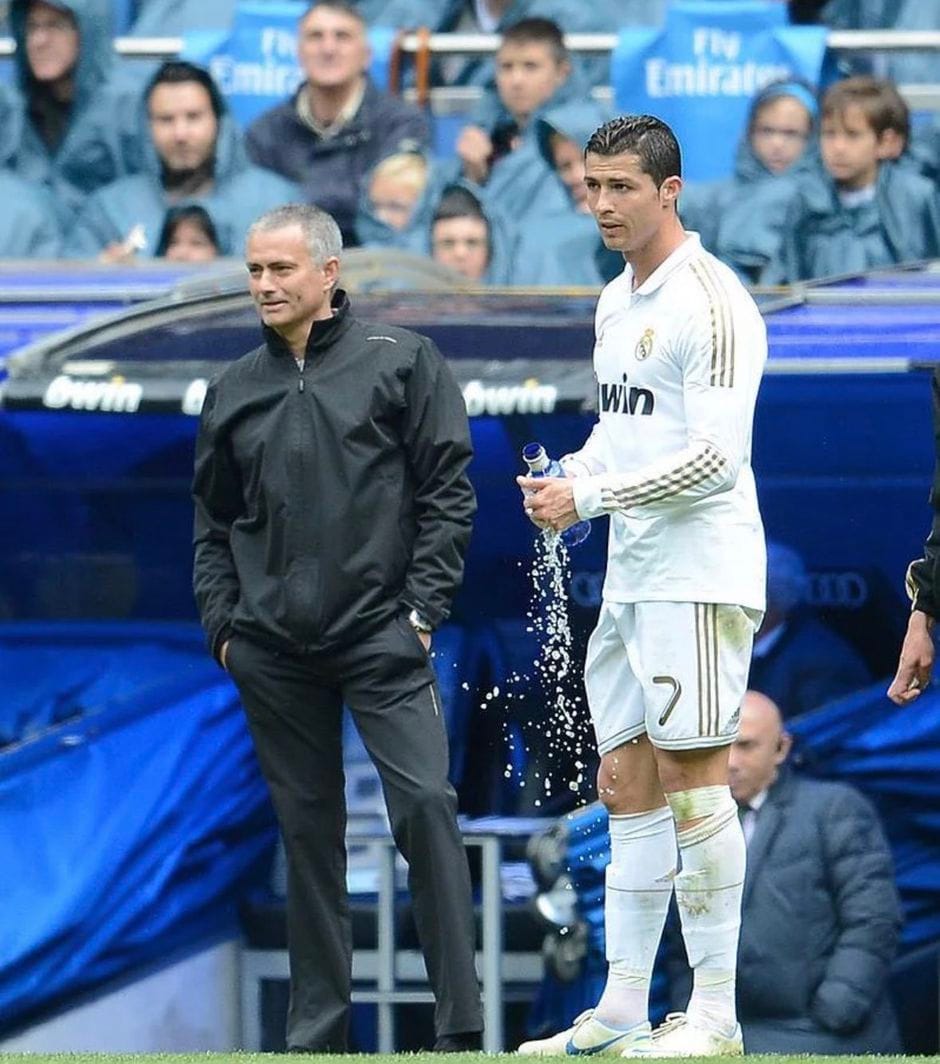
Jose Mourinho and Cristiano Ronaldo at Real Madrid
This formation allowed for rapid counter-attacks, with the four attackers being able to play any of the four offensive positions.
Consequently, Benzema would often drop deep to act as a false 9, thus creating space for Cristiano Ronaldo to make runs off the ball into the centre from the left flank and get on the end of passes.
Mourinho is also praised for his quick reactions to a game’s events and renowned for always being well-informed about his next opponent and tactically outwitting other managers in games.
Mourinho is also acknowledged for his attention to detail, organisational planning and in-game communication. In a 2013–14 Champions League knockout game against Paris Saint-Germain, when Chelsea needed one goal within 10 minutes to progress, he played a risky 4–1–2–3 in the last quarter, which led to Demba Ba’s winning goal.
Since his self proclamation in 2004, Mourinho is often nicknamed “The Special One”.
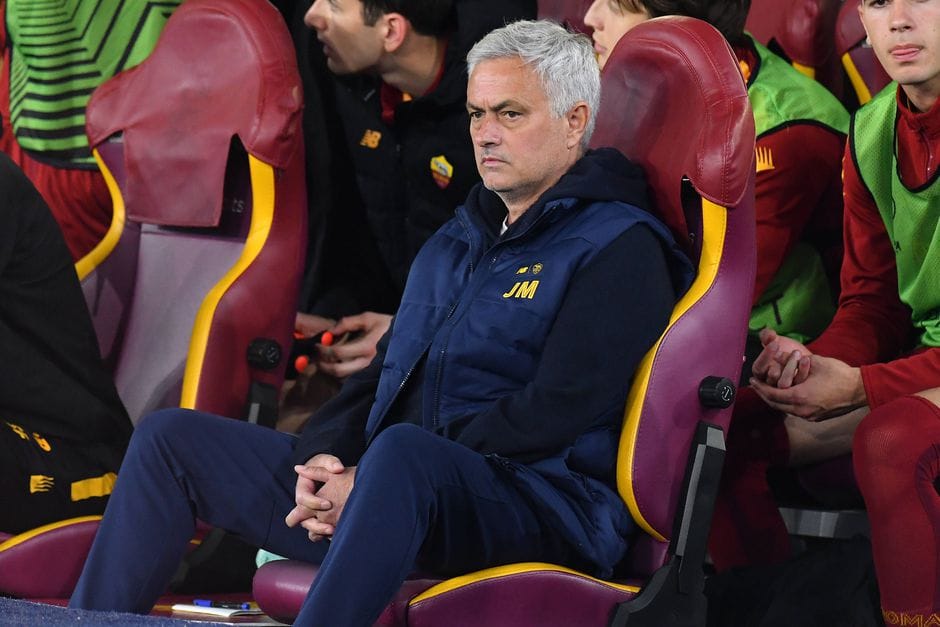
Jose Mourinho is one of the highest-paid football managers in the world
He is widely regarded by several players and coaches to be one of the best managers of his generation and one of the greatest ever managers.
In 2010, Pep Guardiola described Mourinho as “probably the best coach in the world”.
However, a plethora of Mourinho’s tactical decisions have been met with criticism.
Jose Mourinho missed Roma’s clash against Sassuolo and Lazio after he was banned for two games
Throughout his career, he has sometimes been accused of playing defensive, dull football to grind out results.
Mourinho, along with his compatriot Cristiano Ronaldo, is credited with inspiring changing fortunes of Portuguese football in 2010s and 2020s.
Jose Mourinho Salary 2023
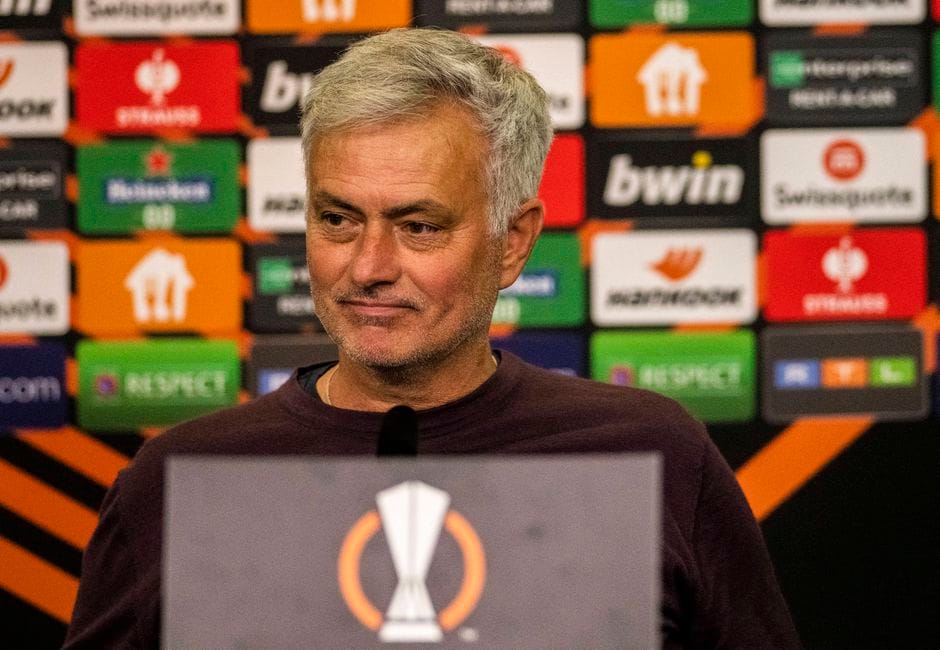
Jose Mourinho is one of the highest-paid football managers in the world
As of September 2023, Jose Mourinho is one of the highest-paid football managers in the world.
He is also the highest-paid coach in the Italian Serie A with an annual paycheck of $7.4 million.
Below are the details of Mourinho’s 2023 salary at AS Roma:
Annual: $7,428,631.00
Monthly: $619,052.58
Weekly: $142,858.29
Daily: $28,571.66
10. Mikel Arteta (Arsenal) – $10 million p/a
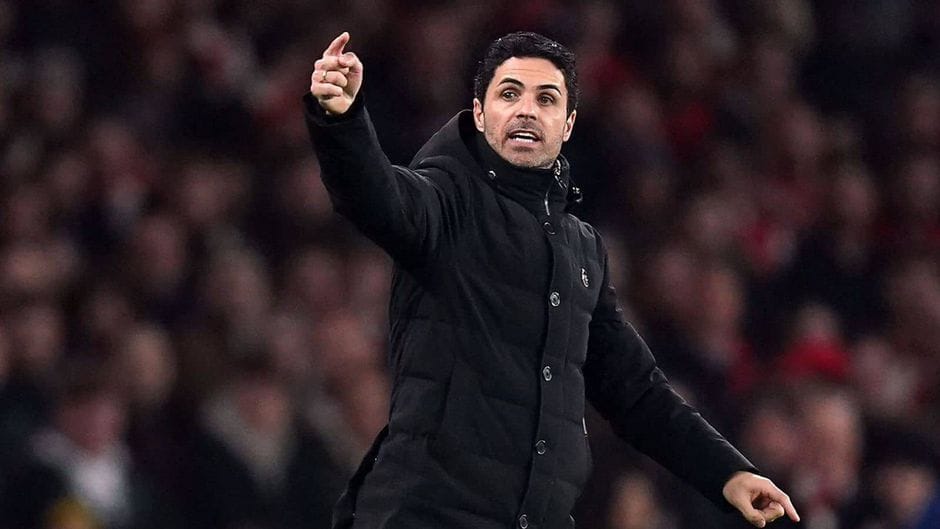
Arsenal manager Mikel Arteta is one of the highest-paid coaches in the world
Mikel Arteta Amatriain is a 41-year-old Spanish professional football manager and former player, who is the current manager of Premier League club Arsenal.
Mikel Arteta is one of the highest-paid football coaches in the world in 2023.
As a manager, he is known for his tactical innovation and his comprehensive football philosophy.
Born and raised in San Sebastián, Arteta began his senior club career at Barcelona in 1999, but limited playing time led to a loan to Paris Saint-Germain in 2001, aged 18.
After winning the UEFA Intertoto Cup during his second season in France, he then signed for Scottish club Rangers for a fee of £6 million.
During his debut season, Arteta won the Scottish Premier League and Scottish League Cup double, where he notably scored a 93rd-minute penalty against Dunfermline Athletic which secured the league title over rivals Celtic on goal difference.
After a brief return to hometown club Real Sociedad, Arteta joined English club Everton on loan in 2005; he later signed permanently.
There, Arteta grew into a pivotal and influential player, winning Everton Player of the Season twice. Signing for Arsenal in 2011 for a reported fee of £10 million, Arteta won two FA Cups and served as captain from 2014 until his retirement in 2016.
Arteta represented Spain through several youth levels, but never played for the senior national team.
He is often noted as one of the best players of the 21st century to be omitted a senior international cap.
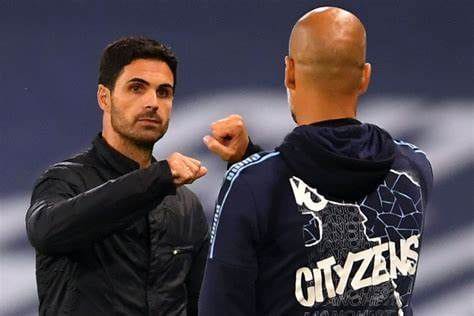
Mikel Arteta and Pep Guardiola
After retiring, he was appointed as an assistant coach to Pep Guardiola at Manchester City.
In 2019, he returned to Arsenal as head coach and won the FA Cup in his first year; his title was changed to manager in September 2020 to reflect his broader remit at the club.
At Arsenal, he has won the FA Cup in the 2019-20 season, and the FA Community Shield in the 2020 season.
Mikel Arteta also won the Premier League manager of the month five times in the 2022-23 Premier League season.
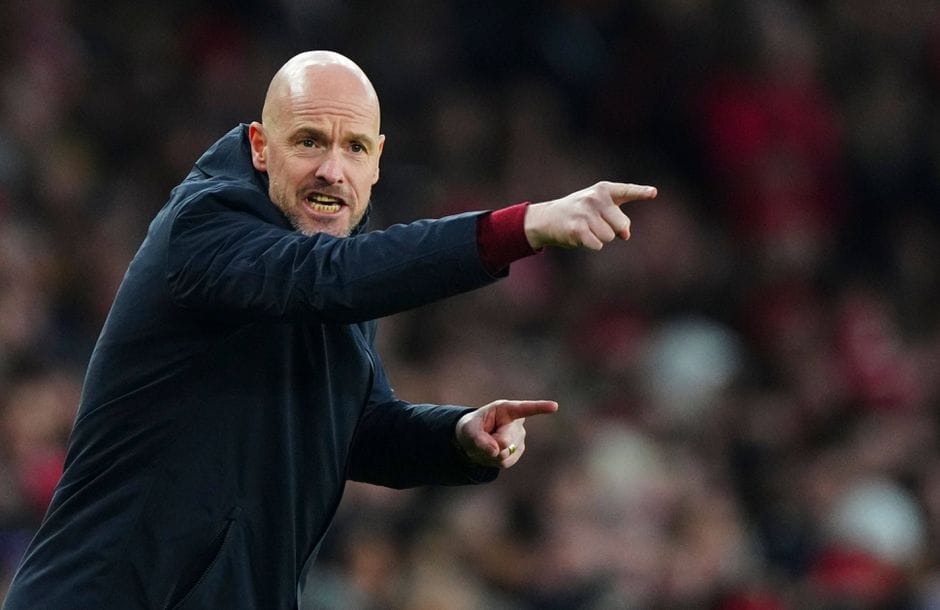
Arsenal coach Mikel Arteta
As of September 2023, Mikel Arteta is one of the highest-paid football managers in the world.
He is also one of the highest-paid coaches in the Premier League with an annual paycheck of $10 million.
Below are the details of Arteta’s 2023 salary at Arsenal:
Annual: $10,048,236.00
Monthly: $837,353.00
Weekly: $193,235.31
Daily: $38,647.06
9. Erik ten Hag (Manchester United) – $10.8 million p/a
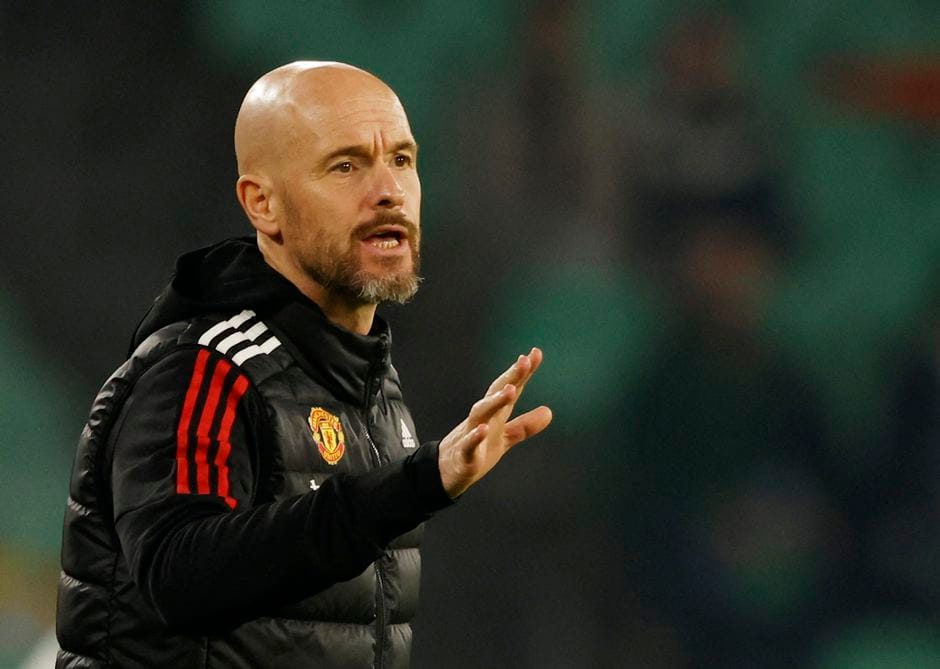
Erik ten Hag is one of the highest-paid coaches in world football
Erik ten Hag is a 53-year-old Dutch professional football manager and former player who is the currently the manager of Premier League club Manchester United.
Erik ten Hag is one of the highest-paid football coaches in the world in 2023.
Ten Hag played as a centre-back and began his career with Eredivisie club Twente.
He joined De Graafschap in 1990, and won the Eerste Divisie in his first season.
He rejoined Twente in 1992 and transferred to RKC Waalwijk two years later, where he remained for one season before signing with Utrecht in 1995.

Ten Hag is one of the highest-paid coaches in the Premier League Erik Ten Hag is making changes at Manchester United
Ten Hag returned to Twente for a third time in 1996, where he won KNVB Cup in 2001.
He retired in 2002, at the age of 32.
Ten Hag began his coaching career in 2012, being appointed as manager of Go Ahead Eagles, where he led the club to promotion to the Eredivisie in his debut season.
He then joined Bayern Munich II in 2013, winning promotion to the Regionalliga Bayern in 2014.
He returned to the Netherlands in 2015 as sporting director and head coach at Utrecht.
He joined Ajax in 2017, where he won three Eredivisie titles, two KNVB Cups, and led the team to the semi-finals of the 2018–19 UEFA Champions League.
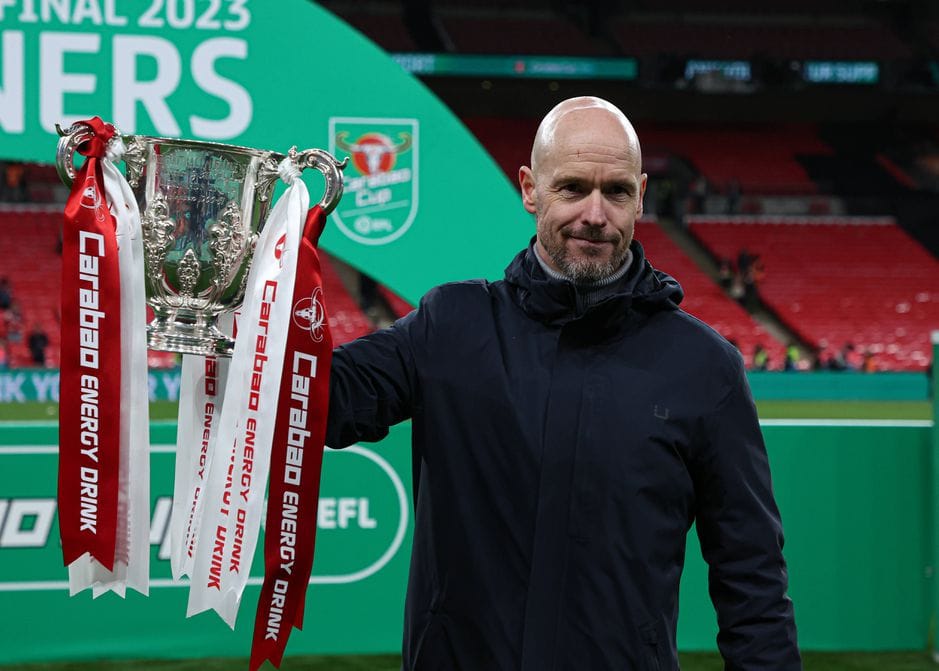
Erik ten Hag won the EFL Cup with Manchester United in 2023
In 2022, he was appointed at Manchester United with whom he has won the EFL Cup in the 2022-23 season.
Erik Ten Hag Salary 2023
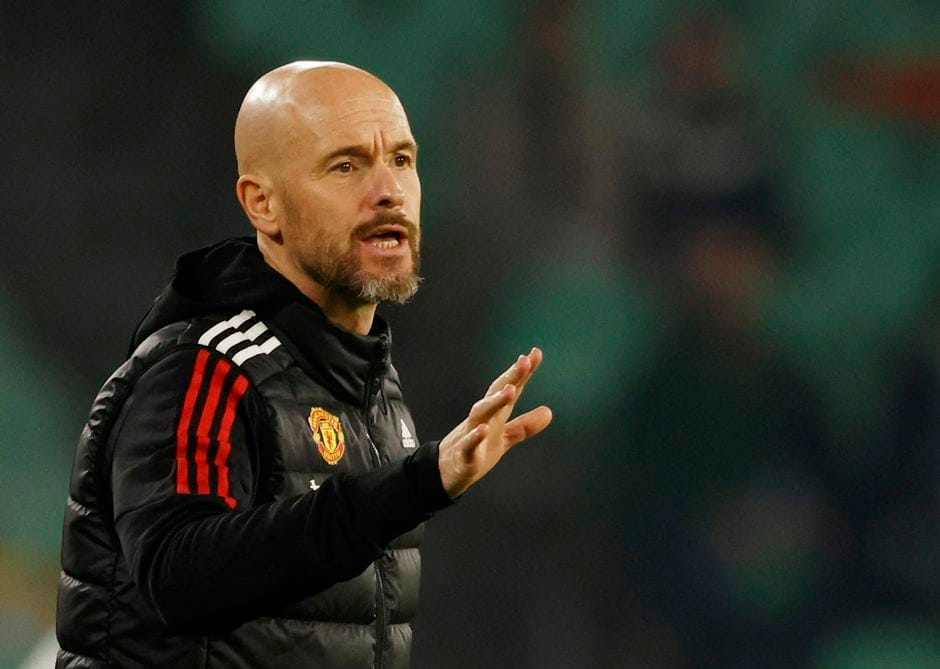
Erik ten Hag is one of the world’s highest-paid coaches in football
As of September 2023, Erik ten Hag is one of the highest-paid football managers in the world.
He is also one of the highest-paid coaches in the Premier League with an annual paycheck of nearly $11 million.
Below are the details of Ten Hag’s 2023 salary at Manchester United:
Annual: $10,895,678.00
Monthly: $907,973.17
Weekly: $209,532.27
Daily: $41,906.45
8. Thomas Tuchel (Bayern Munich) – $11 million p/a
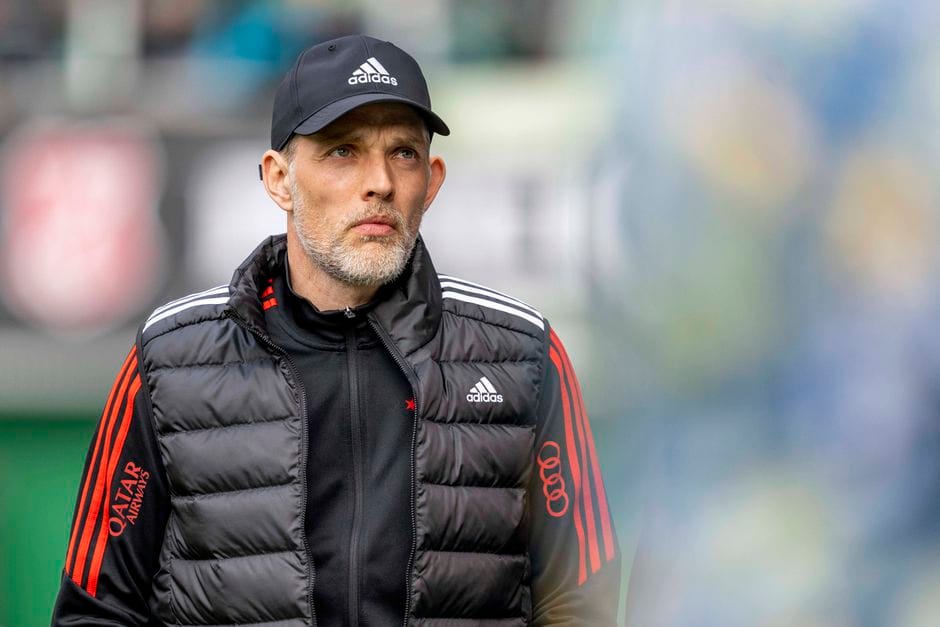
Thomas Tuchel is one of the highest-paid football managers in the world
Thomas Tuchel is a 49-year-old German professional football manager and former player who is the head coach of Bundesliga club Bayern Munich.
Tuchel is one of the highest-paid football coaches in the world in 2023.
Born in Krumbach, Tuchel retired as a footballer at age 25 after a chronic knee cartilage injury; in 2000, he began his coaching career as a youth coach at VfB Stuttgart, and in 2009, after a one-year period at FC Augsburg II, he was hired by Mainz 05.
He departed Mainz in 2014 and was appointed at fellow Bundesliga club Borussia Dortmund in 2015 and won the DFB-Pokal before being dismissed in 2017.
He was hired by Ligue 1 club Paris Saint-Germain in 2018 and won two league titles, including a domestic quadruple in his second season, and guided the club to its first UEFA Champions League final which they eventually lost narrowly to Bayern Munich in 2020.
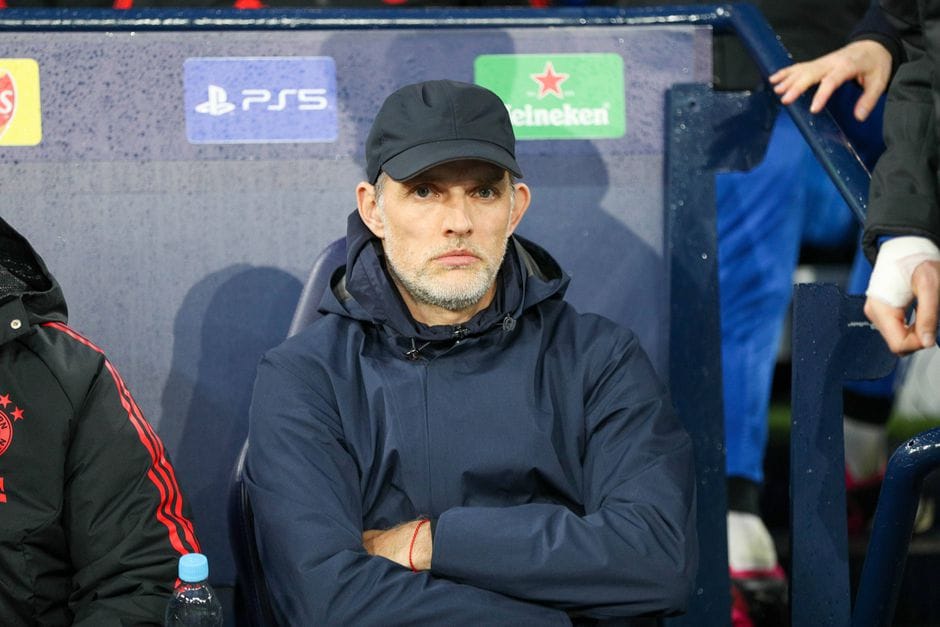
Thomas Tuchel is one of the highest-paid coaches in the world football
Tuchel was appointed by Chelsea in 2021, where he won the Champions League in his debut season and was named The Best FIFA Football Coach
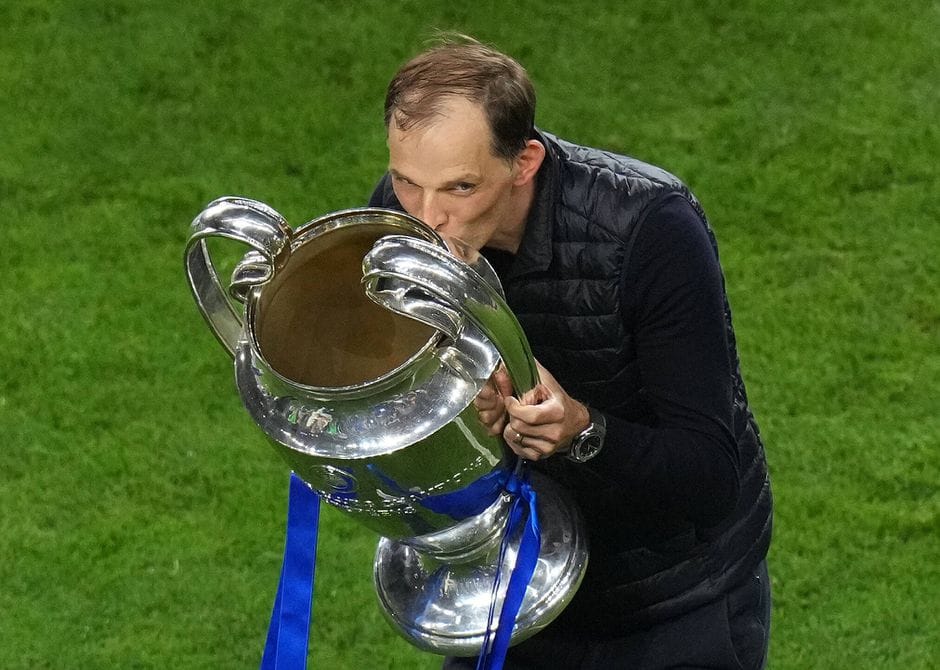
Thomas Tuchel led Chelsea to a Champions League trophy over Manchester City
He was dismissed as manager in 2022, and was appointed at Bayern Munich in 2023, replacing Julien Nagelsmann.
Thomas Tuchel Coaching Style
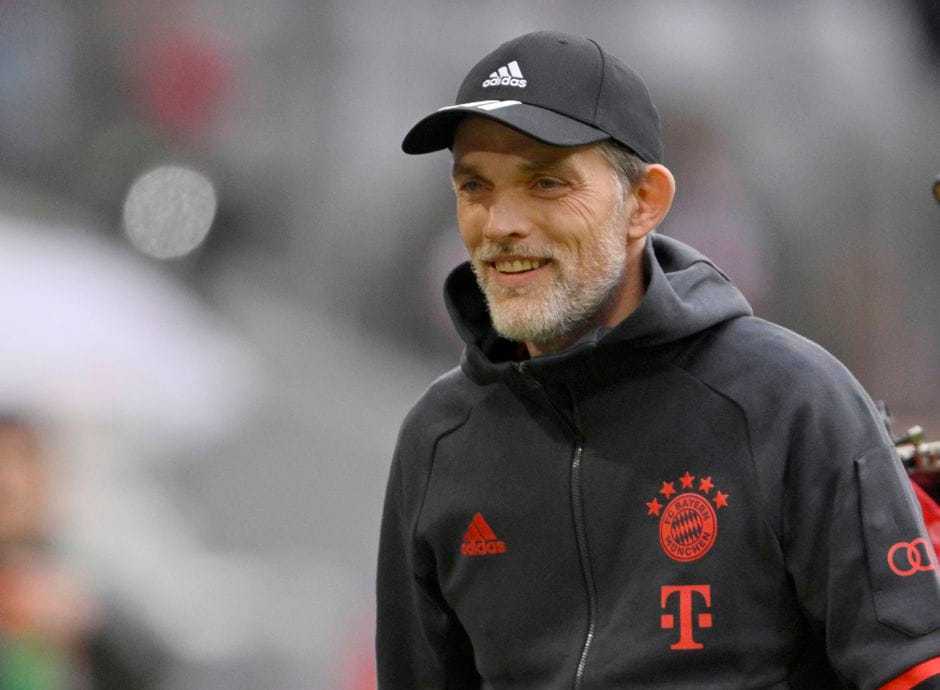
Bayern Munich coach Thomas Tuchel
Thomas Tuchel is known for his tactical knowledge and flexibility as well as his implementation of innovative training methods.
During his tenure at Mainz, Tuchel used rondos, cut the corners off the training pitch in an effort to improve passing and movement, and obliged his players to hold tennis balls during defensive drills to keep unnecessary fouling in check.
He reportedly once paused a documentary on Pep Guardiola for two hours on the Mainz bus to study a graph which showed Barcelona’s passing patterns.
He also discussed tactics with Guardiola for four hours in Munich.
Tuchel has borrowed training methods from other sports, including archery and kick-boxing; he once made the team spend close to a month training with a handball team.
Tuchel is known as an innovator in the game, and often compared to Guardiola.
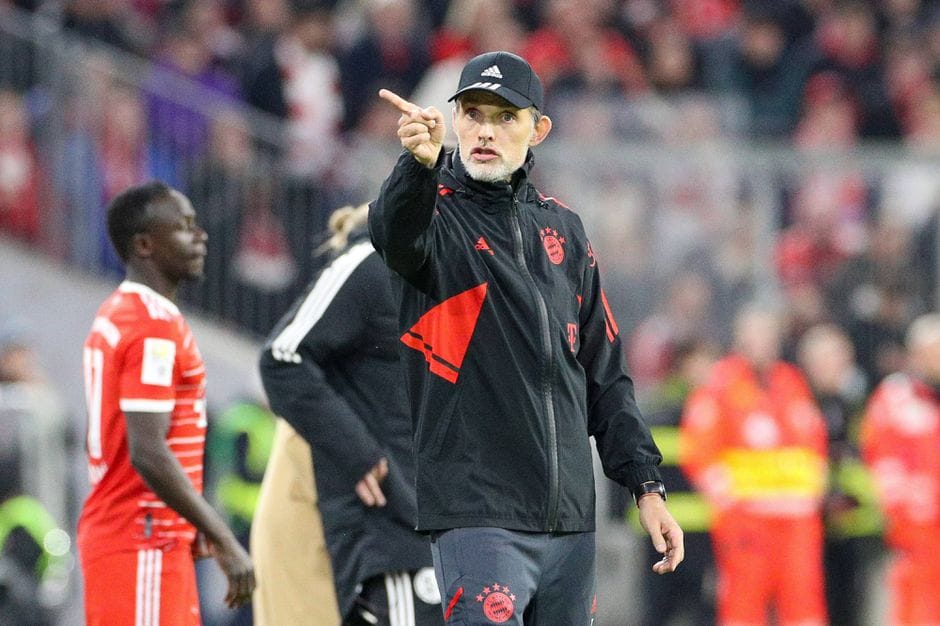
Thomas Tuchel of Bayern Munich
Chelsea fans called him Tommy Tactics in reference to the high-level of tactical play seen under Tuchel.
With Dortmund, Tuchel often used the 4–1–4–1 and 4–2–3–1 formations; with Mainz, he made his team force overloads in space out wide, while with the latter, he looked to create overloads in pockets of space in between the lines of the opposition.
At Paris Saint-Germain, Tuchel primarily played a 4–3–3 with plenty of flair to emphasize the attacking capabilities of wide forwards Neymar and Mbappé, although he used up to ten different formations while at the club.
Tuchel has been cited as an initial disciplinarian, as he implemented bans on eating refined carbohydrates, replacing it with wholemeal pasta and light sauces.
However, he reportedly changed this approach after being appointed at PSG.
At Chelsea, Tuchel was known for making frequent player alterations in his early tenure; he made 39 changes to the starting lineup in 10 Premier League games between January and March 2021
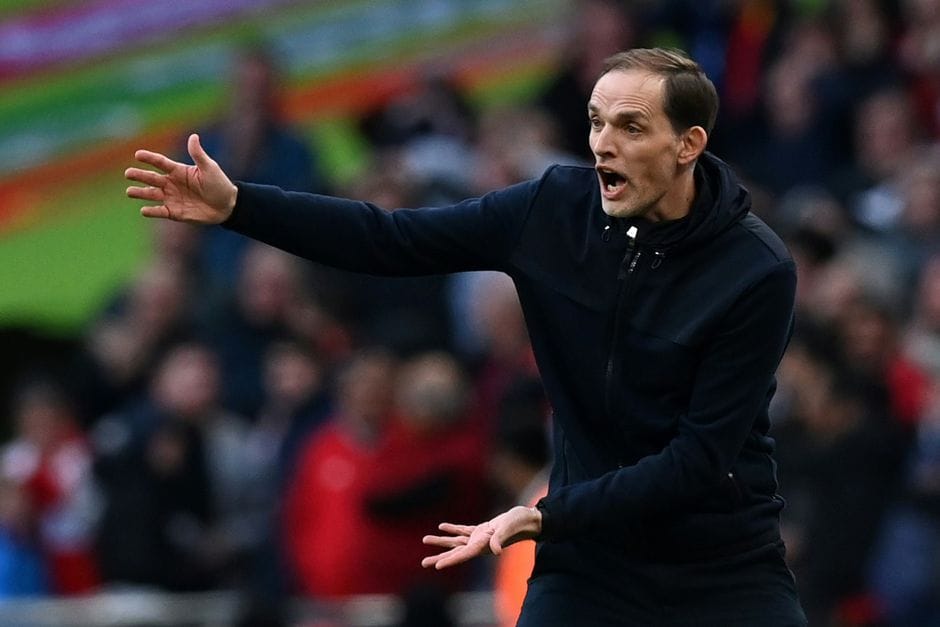
Thomas Tuchel of Bayern Munich
He mostly preferred a 3–4–2–1 with ball progression largely coming from the wingbacks, a position mainly played by Reece James and Ben Chilwell, while also restoring Antonio Rüdiger to a first-team regular, deploying him as a left centre-back in a back three, despite Rüdiger being right-footed.
Liverpool manager Jurgen Klopp, his contemporary, once said on Tuchel’s “exceptional” rise through the ranks: “He’s an outstanding coach and an outstanding manager”.
Man City manager Pep Guardiola also expressed his admiration for Tuchel’s footballing philosophy, saying:
“He’s so creative. One of the few managers I learn from. Excellent in all departments. I enjoy watching his teams, the way he plays [and] his approach.”
Sources close to Chelsea noted Tuchel’s strong communication skills with players and light tone; to assimilate with the playing squad, Tuchel regularly organized external team outings and activities.
However, tensions reportedly rose at Chelsea as Tuchel ‘brutally’ criticized the club’s attacking for failing to carry out his tactics.
Thomas Tuchel Salary 2023
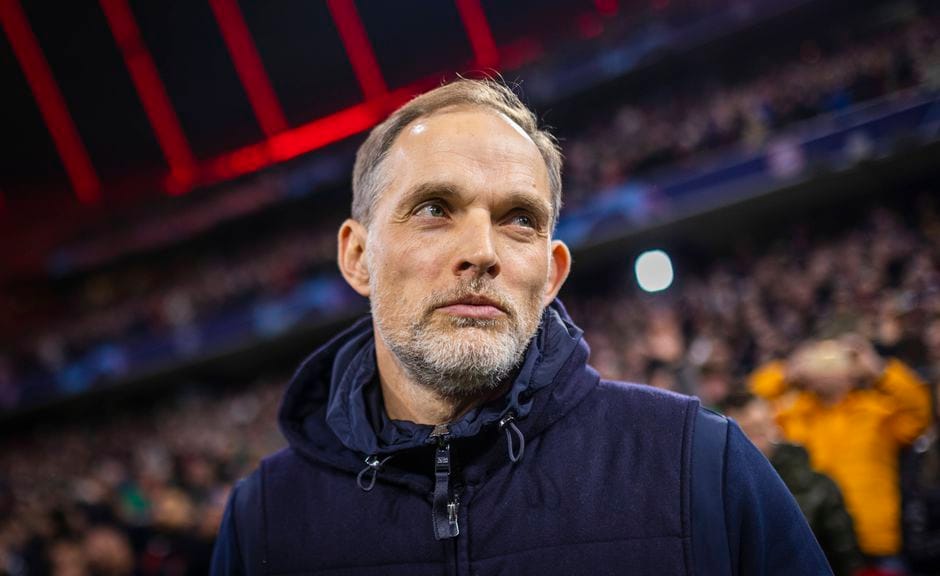
Thomas Tuchel is the highest-paid coach in the Bundesliga
As of September 2023, Thomas Tuchel is one of the highest-paid football managers in the world.
He is also reportedly the highest-paid coach in the German Bundesliga with an annual paycheck of more than $11 million.
Below are the details of Thomas Tuchel’s 2023 salary at Bayern Munich:
Annual: $11,142,946.00
Monthly: $928,578.83
Weekly: $214,287.42
Daily: $42,857.48
7. Carlo Ancelotti (Real Madrid) – $11.5 million p/a

Caro Ancelotti is one of the highest-paid football managers in the world
Carlo Ancelotti is a 63-year-old Italian professional football manager and former player who is the manager of La Liga club Real Madrid.
Carlo Ancelotti is also one of the highest-paid football coaches in the world in 2023.
Regarded as one of the greatest managers of all time, Ancelotti is the most decorated manager in UEFA Champions League history, having won the trophy a record four times as coach (twice with AC Milan and twice with Real Madrid).
He is also the first and only one to have managed teams in five Champions League finals.
As a player, he won the European Cup twice with AC Milan in 1989 and 1990, making him one of eight people to have won the European Cup or Champions League as both a player and a manager.
Ancelotti is also the first and only manager ever to have won league titles in all of Europe’s top five leagues.
He has won the FIFA Club World Cup a joint-record three times, and is also the manager with the most UEFA Super Cup triumphs, having won the trophy on four occasions, managing Milan and Real Madrid.
Nicknamed Don Carlo, Ancelotti played as a midfielder and began his career with Italian club Parma, helping the club to Serie B promotion in 1979.
He moved to Roma the following season, where he won a Serie A title and four Coppa Italia titles, and also played for the late 1980s Milan team, with which he won two league titles and two European Cups, among other titles.
At international level he played for the Italy national team on 26 occasions, scoring once, and appeared in two FIFA World Cups, finishing in third place in the 1990 edition of the tournament, as well as UEFA Euro 1988, where he helped his nation to reach the semi-finals.
As a manager, Ancelotti worked for Reggiana, Parma, Juventus between 1995 and 2001, before rising to prominence with Milan.
Appointed as Milan manager in 2001, he went onto win both the 2002–03 Champions League and 2002–03 Coppa Italia.
The following season, he won the Scudetto with an Italian record of 82 points from 34 games, and three years later he won his second Champions League with Milan.
During his tenure with Milan, Ancelotti was awarded the Serie A Coach of the Year twice.
He announced his resignation from Milan after the 2008–09 season, leaving as Milan’s longest-serving manager in a single spell.
In 2009, he was appointed manager of Chelsea, winning the domestic double of the Premier League and FA Cup in his first season.
In 2011, he became the manager of French club Paris Saint-Germain and won them their first Ligue 1 title in 19 years the following season.
That triumph saw him awarded joint Ligue 1 Manager of the Year.
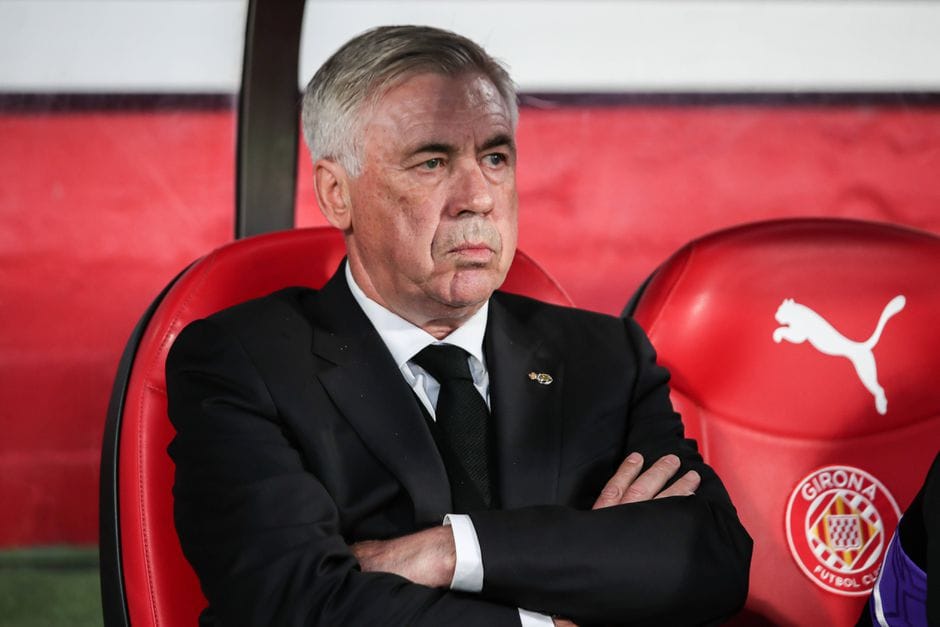
Carlo Ancelotti’s Real Madrid have had a poor title defence.
Following his success in France, Ancelotti was appointed manager of Sanish LaLiga giants Real Madrid.
In his first season, he led Real Madrid to their long-sought tenth Champions League title, La Décima, and also won the Copa del Rey.
Despite collecting further honours with the club and being awarded the Miguel Muñoz Trophy in 2014–15 for the best performing manager in La Liga, Ancelotti was dismissed from Real Madrid in May 2015.
He became the head coach of Bayern Munich in 2016, succeeding Pep Guardiola, where he won the Bundesliga title in his first season, and following stints at Napoli and Everton between 2018 and 2021, he returned to Real Madrid in the summer of 2021, where he went on to win a La Liga–Champions League double.
Carlo Ancelotti Coaching Style

Real Madrid manager Carlo Ancelotti
Toward the beginning of his coaching career, and during his time with Parma, Ancelotti preferred to use a rigorous 4–4–2 formation, which made use of heavy pressing, and drew influence from that of his Milan and Italy coach Arrigo Sacchi, and which he believed to be the most successful system for his team.
However, this system was flawed and did not allow for more creative forwards, such as Gianfranco Zola, Hristo Stoichkov and Roberto Baggio, to play in their preferred positions, ultimately leading to Zola and Stoichkov’s departure from the club, while Baggio’s transfer to Parma in 1997 was impeded by Ancelotti.
Ancelotti later stated that he regretted his intransigence, and when he joined Juventus, he abandoned his favoured 4–4–2 in favour of a 3–4–1–2 system, in order to accommodate Zinedine Zidane in his preferred advanced playmaking role behind the forwards.
Despite his initial reputation as a tactically inflexible coach, with Milan, Ancelotti later drew praise for his ability to find systems which would best suit his players, and which allowed several talented and creative players to co-exist.
Under Ancelotti’s management, Milan enjoyed one of the most fruitful spells in its history. Carlo Ancelotti’s Milan sides almost always used a strong four-man back-line, a main striker and an attacking midfielder.
At Real Madrid, Ancelotti similarly drew praise for his versatility; he modified the team’s 4–2–3–1 formation, which had been used under José Mourinho, to a 4–4–2 formation, before settling on a 4–3–3 formation, in which Argentine former winger Ángel Di María was converted to a left-sided central midfielder, while Cristiano Ronaldo was played in his preferred free role on the left wing rather than as a striker, as Ancelotti had initially intended.
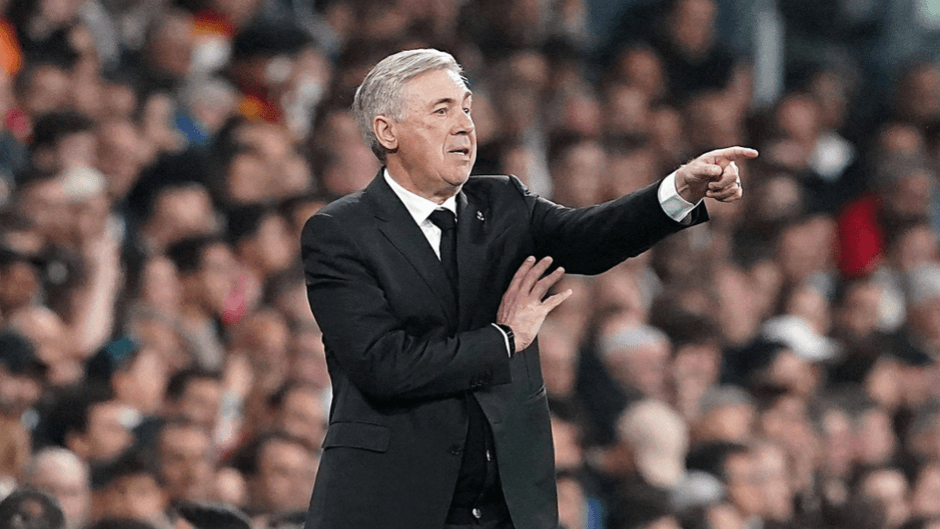
Carlo Ancelotti of Real Madrid
Di María particularly excelled in this new role and played a key role in the club’s successes.
In addition to his tactical prowess and adaptability, Ancelotti has also drawn praise for his kindness, good sense of humour, and his calm, balanced approach as a manager, as well as his ability to motivate his players and cultivate a good relationship with them, while fostering a united, winning team environment, although he has also been known to lose his temper at times.
During his second spell at Real Madrid, although he implemented a more simple but effective counter–attacking style with the team, Ancelotti once again earned praise in the media for his balanced approach, adaptability, and man–management abilities during the club’s run to a Liga–Champions League double.
Ancelotti’s ability to develop a strong relationship with his players and his willingness to consult them on tactical decisions were singled out by several pundits in particular as reasons for the team’s success and unity.
Ancelotti is also known to be one of calmest coaches under pressure and in the midst of his team’s struggles on the pitch.
Nicknamed Don Carlo by the Spanish media, Ancelotti is regarded as one of the greatest and most successful managers of all time, and has drawn praise in the press for his longevity as well as his record–breaking achievements.
Carlo Ancelotti Salary 2023
Carlo Ancelotti, the Real Madrid manager is one of the highest-paid coaches in the world
As of September 2023, Carlo Ancelotti is one of the highest-paid football managers in the world.
He is also the second highest-paid coach in LaLiga with an annual paycheck of $11.5 million.
However, Ancelotti continues to be linked with a move away from the Santiago Bernabeu with the Brazil national team role understood to be his next destination – a move that would no doubt see a signifcant increase in his earnings.
Below are the details of Ancelotti’s 2023 salary at Real Madrid:
Annual: $11,588,664.00
Monthly: $965,722.00
Weekly: $222,858.92
Daily: $44,571.78
6. Brendan Rodgers – $12.1 million p/a
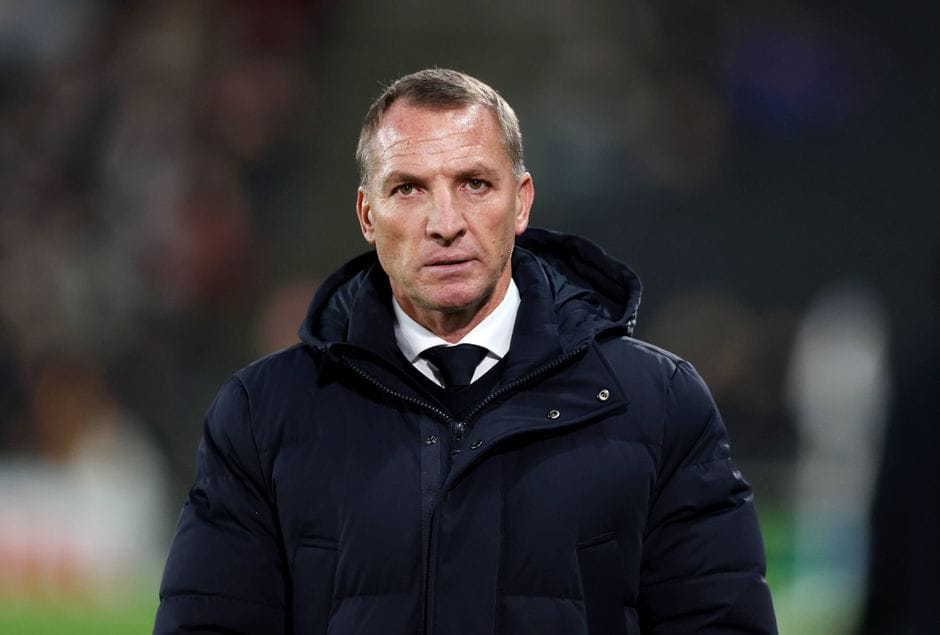
Brendan Rodgers left Leicester City after only two wins in 2023
Brendan Rodgers is a 50-year-old Northern Irish professional football manager of Scottish Premiership club Celtic.
Rodgers began his career as a defender at Ballymena United, where he stayed until he was signed by Reading at the age of 18, although a genetic knee condition forced him to retire at age 20.
He remained at Reading as a coach and then academy director, and continued to play non-league football at Newport, Witney Town and Newbury Town for several years.
After a period travelling around Spain to study coaching methods, he was invited by José Mourinho to leave Reading and join Chelsea as youth manager in 2004, later being promoted to reserve manager in 2006.
In 2008, he was appointed manager of Watford, where he remained until he accepted an offer to become manager of his former club Reading in 2009.
He left the club by mutual consent after some disappointing results six months later.
He returned to management with Swansea City in 2010, leading the club to promotion to the Premier League, the first Welsh team to do so, before guiding them to finish 11th the following season.
On 1 June 2012, Rodgers accepted an offer to become the new manager of Liverpool, whom he led to runners-up position in the league in the 2013–14 season before his dismissal in October 2015.
He became manager of Celtic in May 2016 and led Celtic to an undefeated domestic season in his first year, and trebles in both of his first two seasons.
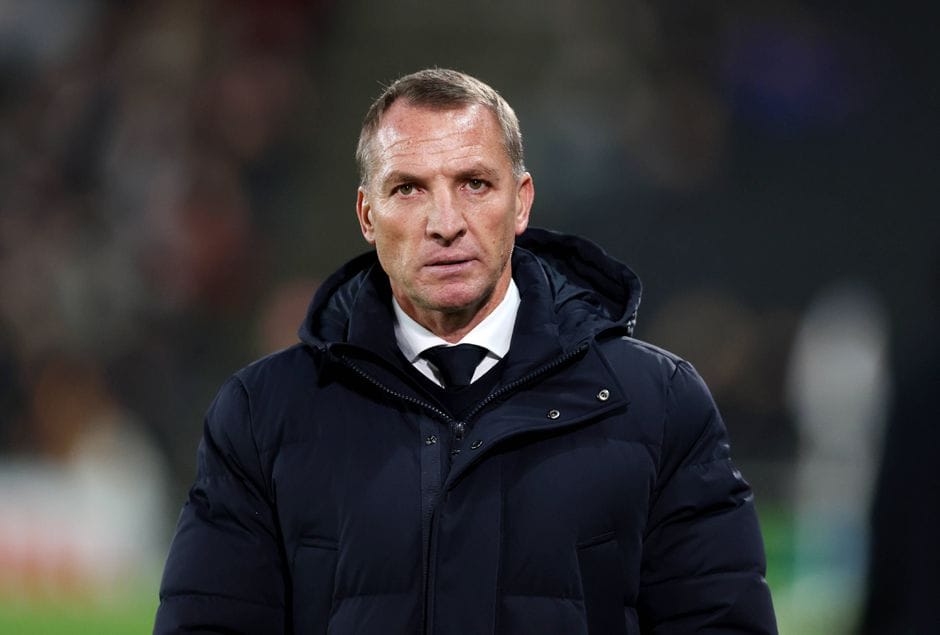
Brendan Rodgers is one of the higehst-paid football managers in the world
He left Celtic for Leicester City in February 2019, winning the 2021 FA Cup in his second full season, before leaving by mutual consent on April 2, 2023, following a 2–1 defeat against fellow strugglers Crystal Palace.
Two days later, Rodgers said he had every confidence he would have been able to keep the team in the Premier League.
In June 2023, Rodgers returned to Celtic, agreeing a three-year contract to replace outgoing manager Ange Postecoglou who took up the role of head coach at Tottenham Hotspur.
Brendan Rodgers Coaching Style
Former Leicester manager Brendan Rodgers
Rodgers believes in his teams keeping possession of the ball and playing a flowing passing and attacking game with the ball always moving; defensively, he likes his team to put a lot of pressure on the opposing team.
His Liverpool team during the 2013–14 season interchanged from 4–5–1 to 3–5–2 to 4–4–2 to 4–3–3 to a diamond formation.
Steven Gerrard described Rodgers’ one-on-one management as the best he had seen.
Brendan Rodgers Salary 2023
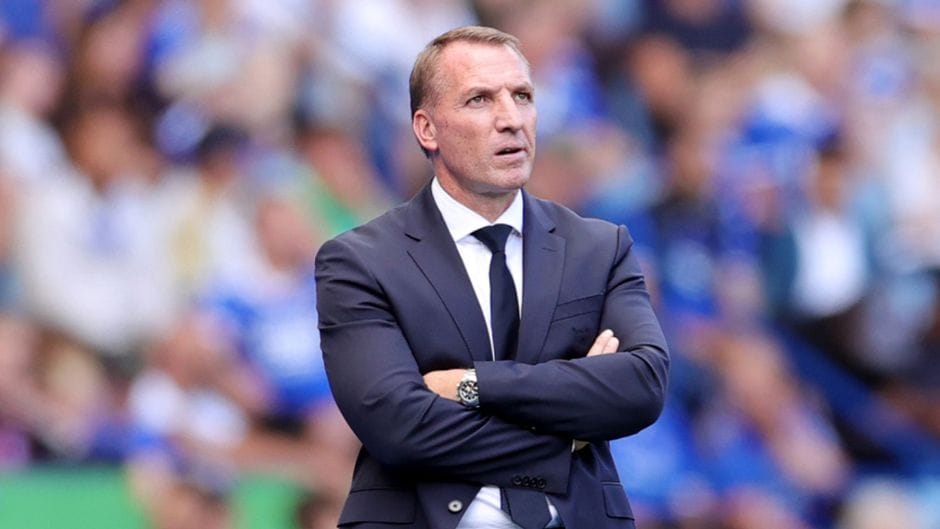
Brendan Rodgers is one of the highest-paid coaches in the world
As of September 2023, Brendan Rodgers is reportedly one of the highest-paid football managers in the world.
Rodgers’ salary at Leicester City before his exit in 2023 was reportedly around $12 million annually and his new salary at Celtic is expected to be around that figure.
Below are the details of Brendan Rodgers’ 2023 salary at Leicester City:
Annual: $12,106,309.00
Monthly: $1,008,859.08
Weekly: $232,813.63
Daily: $46,562.73
5. Zinedine Zidane – $12.7 million p/a
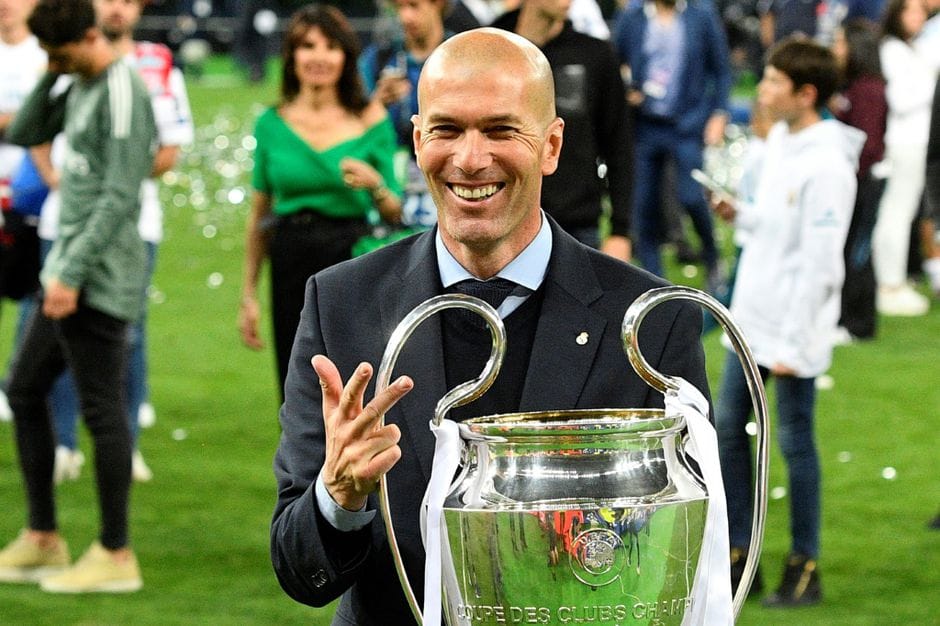
Zinedine Zidane is one of the highest-paid football managers in the world 2023
Zinedine Yazid Zidane, popularly known as ‘Zizou’, or simply Zinedine Zidane, is a French professional football manager and former player who played as an attacking midfielder.
He most recently coached Spanish club Real Madrid and is one of the most successful coaches in the world.
Zidane is notably one of the highest-paid coaches in world football.
Widely regarded as one of the greatest players of all time, Zidane was a playmaker renowned for his elegance, vision, passing, ball control, and technique.
He received many individual accolades as a player, including being named FIFA World Player of the Year in 1998, 2000 and 2003, and winning the 1998 Ballon d’Or.
Zidane started his career at Cannes before establishing himself as one of the best players in the French Ligue 1 at Bordeaux.
In 1996, he moved to Italian team Juventus, where he won several trophies including two Serie A titles.
He moved to Real Madrid for a world record fee at the time of €77.5 million in 2001, which remained unmatched for the next eight years.
In Spain, Zidane won several trophies, including a La Liga title and the UEFA Champions League.
In the 2002 Champions League final, he scored a left-foot volleyed winner that is considered one of the greatest goals in the competition’s history.
Capped 108 times by France, Zidane won the 1998 FIFA World Cup, scoring a brace in the final, and was named to the All-Star team.
This triumph made him a national hero in France and he received the Legion of Honour in 1998.
He won UEFA Euro 2000 and was named Player of the Tournament.
He also received the Golden Ball as Player of the Tournament at the 2006 World Cup, despite his infamous sending off in the final against Italy for headbutting Marco Materazzi in the chest.
He retired as the fourth-most capped player in French history.
In 2004, he was named in the FIFA 100, a list of the world’s greatest living players compiled by the great Pelé, and in the same year was named the best European footballer of the past 50 years in the UEFA Golden Jubilee Poll.
Zidane is one of nine players to have won the World Cup, the Champions League, and the Ballon d’Or.
He was the ambassador for Qatar’s successful bid to stage the 2022 World Cup, the first Arab country to host the tournament.
After retiring as a player, Zidane began his coaching career at Real Madrid Castilla.
He remained in the position for two years before taking the helm of the first team in 2016.
In his initial two and a half seasons, Zidane became the first coach to win the Champions League three times in a row, won the UEFA Super Cup and FIFA Club World Cup twice each, as well as a La Liga title and a Supercopa de España.
This success led to Zidane being named Best FIFA Men’s Coach in 2017.
He resigned in 2018, but returned to the club in 2019 and won another La Liga and a Supercopa de España title before leaving again in 2021.
Zinedine Zidane Coaching Style
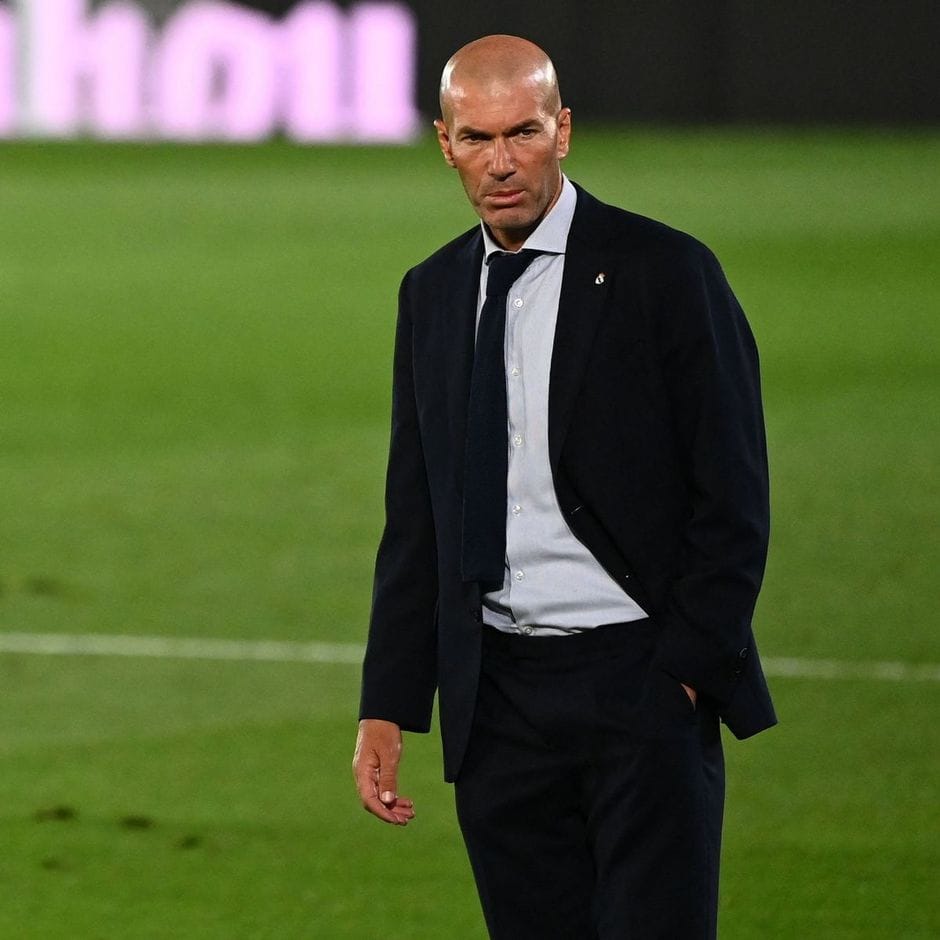
Former Real Madrid manager Zinedine Zidane is one of the highest-paid football managers in the world
Despite establishing himself as one of the most successful coaches of his era and in the history of Real Madrid, Zidane’s time at Real Madrid was considered by some to be shadowed by a partial amount of luck.
However, Zidane’s tactical philosophy, particularly his tactical flexibility, has been praised by many.
Zidane’s tactical style, characterized by its formation flexibility and attacking football, as well as his ability to unite the dressing room, have been positively compared to Carlo Ancelotti’s coaching method.
Zidane’s use of in-game substitutions was particularly praised, as many of his substitutes led to victories, such as introducing Marco Asensio and Lucas Vázquez in order to provide pace and width against Paris Saint-Germain in the UEFA Champions League to overturn a 1–0 deficit into a 3–1 victory.
Similarly, his use of Gareth Bale as a substitute in the 2018 UEFA Champions League Final proved crucial; Bale scored two goals after being brought on, turning a 1-1 tie into a 3-1 Madrid victory.
It is also noted that his team focused on attacking through the flanks, while he is credited for repopularising the 4–4–2 diamond formation in contemporary football.
Zidane emphasised the importance of players’ physical levels and preferred to choose impactful players over a defined system.
During his time at Real Madrid, he used several formations, including the 4–3–3, the 4–2–3–1, the 4–4–2, and the 3–5–2, in order to find the system that best suited his players, and has been credited with using “simple systems”, “…so that his players have the freedom needed to prove their superiority.”
As such, although he is not considered to be a tactical innovator, he has often been praised for his balanced approach as a coach, and for having the leadership skills and personability to manage and motivate several world class players, create a good team environment, foster professional relationships, and a strong winning mentality.
Zidane has also demonstrated an ability to rotate players and get the best out his team, which has played a key role in his success.
Two of his main influences as a manager are his own former managers Marcello Lippi and Carlo Ancelotti.
Zinedine Zidane Salary 2023
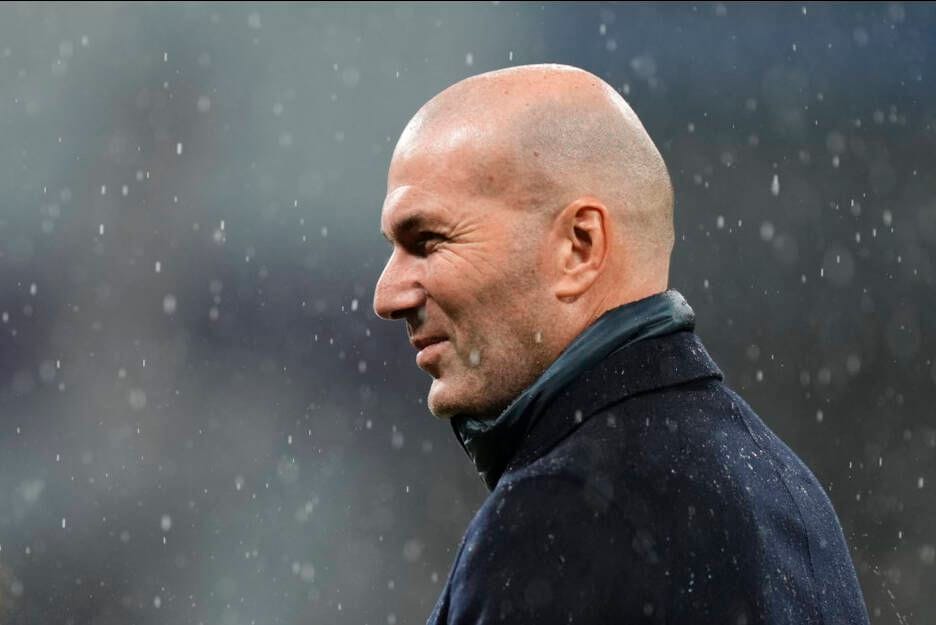
PSG would want Zidane to repeat his Real Madrid magic at the club
Zidane is reportedly one of the highest-paid football managers in the world.
Currently a free agent, Zidane’s previous salary at Real Madrid before his exit in 2021 was reportedly over $12 million annually.
The Frenchman has been linked with a host of coaching roles in Europe and internationally, although, it is not yet known where Zidane’s next destination is.
Regardless, he is expected to earn nothing less than his previous salary at Madrid.
4. Steven Gerrard (Al-Ettifaq) – $19.1 million p/a

Steven Gerrard signed as the new head coach of Al-Ettifaq this summer| Photo Credit: X
Steven George Gerrard is a 43-year-old English professional football manager and former player who is the current manager of Saudi Pro League club Al-Ettifaq.
Gerrard played for Liverpool from 1998 to 2015, winning nine trophies, including the UEFA Champions League, two FA Cups and three League Cups.
He was Man of the Match in the 2005 UEFA Champions League final, in which Liverpool overturned a 3–0 deficit to defeat AC Milan on penalties, and the 2006 FA Cup final, which has been termed The Gerrard Final in homage to his performance.
Despite success in cup competitions, Steven Gerrard never won the Premier League.

Steven Gerrard is the fourth highest-paid football coach in the world| Photo Credit: Imago
During his career, Gerrard was thrice selected in the FIFA FIFPRO Men’s World 11.
He won 114 England caps between 2000 and 2014, captaining the team 38 times and scoring 21 goals.
He played at three UEFA European Championships, in 2000, 2004 and 2012 (where he was named in the Team of the Tournament) and three FIFA World Cups, in 2006, 2010 and 2014.
Gerrard began his managerial career managing the Liverpool Youth Academy’s under-18 team, before starting his senior managerial career in 2018 with Scottish Premiership club Rangers.
In his third full season in charge at Ibrox, Gerrard’s side went unbeaten in the league to win Rangers’ first league title in 10 years.
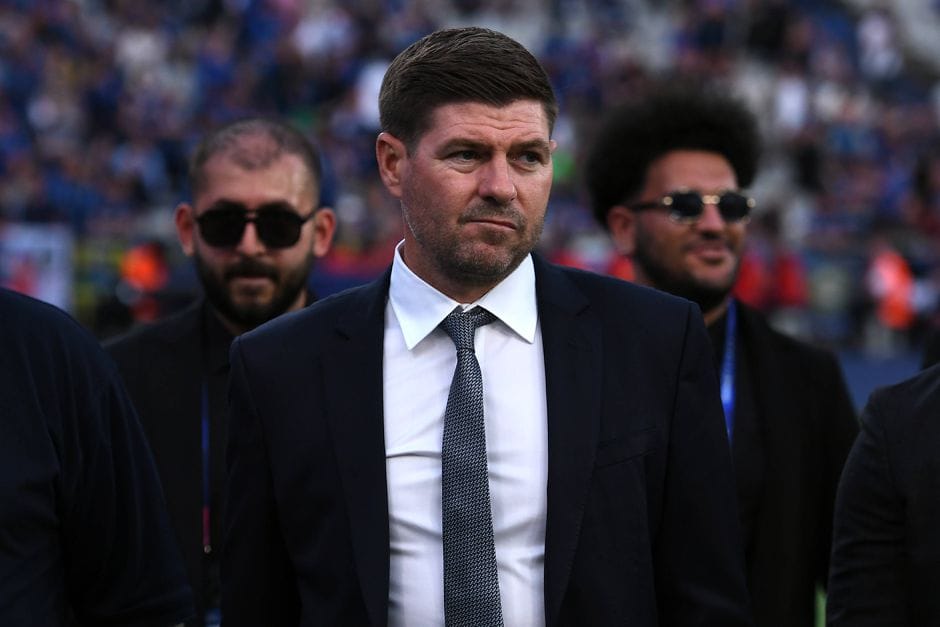
Steven Gerrard is one of the highest-paid football coaches in the world in 2023| Photo Credit: Imago
In November 2021, he became the manager of Aston Villa, but after just 11 months in charge, he was sacked due to a poor run of results.
On 3 July 2023, Gerrard became the manager of Saudi Pro League club Al-Ettifaq, having signed a contract that made him one of the highest-paid football coaches in the world.
Steven Gerrard Salary 2023
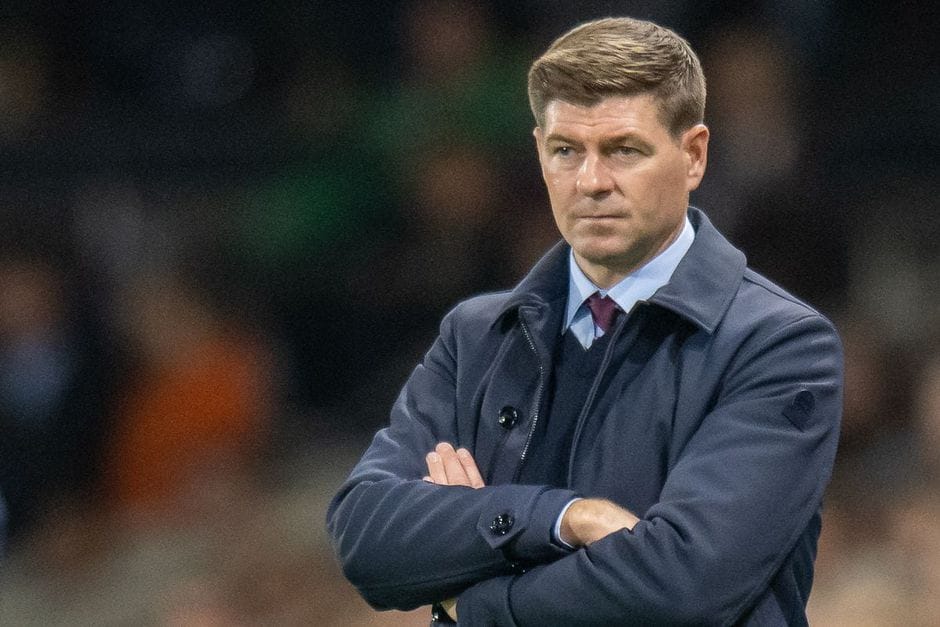
Steven Gerrard is one of the highest-paid football coaches in the world in 2023| Photo Credit: Imago
As of September 2023, Steven Gerrard is one of the highest-paid football coaches in the world.
After initial negotiations fell through, Gerrard finalized a three-year contract with Saudi Pro League club Al-Ettifaq in the summer of 2023.
As reported by The Sun, Gerrard’s contract guarantees him an annual income of over $19 million.
Below are the details of Gerrard’s 2023 salary at Al-Ettifaq:
Annual: $19,105,716
Monthly: $1,592,143
Weekly: $398,035.75 Daily: $56,862.25
3. Jürgen Klopp (Liverpool) – $19.3 million p/a

Liverpool boss Jurgen Klopp is one of the highest-paid football managers in the world
Jürgen Norbert Klopp commonly known as Jürgen Klopp is a 55-year-old German professional football manager and former player who is the manager of Premier League club Liverpool.
He is widely regarded as one of the best managers in the world and one of the highest-paid football managers in the world.
Klopp spent most of his playing career at Mainz 05.
He was initially deployed as a striker, but was later moved to defence.
Upon retiring in 2001, Klopp became the club’s manager, and secured Bundesliga promotion in 2004.
After suffering relegation in the 2006–07 season and unable to achieve promotion, Klopp resigned in 2008 as the club’s longest-serving manager.
He then became manager of Borussia Dortmund, guiding them to the Bundesliga title in 2010–11, before winning Dortmund’s first-ever domestic double during a record-breaking season.
Klopp also guided Dortmund to a runner-up finish in the 2012–13 UEFA Champions League before leaving in 2015 as their longest-serving manager.
Klopp was appointed manager of Liverpool in 2015.
He has guided the club to UEFA Champions League finals in 2018 and 2022, and won the trophy in 2019 to secure his first – and Liverpool’s sixth – title in the competition.
Klopp’s side finished second in the 2018–19 Premier League, registering 97 points; the then third-highest total in the history of the English top division, and the most by a team without winning the title.
The following season, Klopp won the UEFA Super Cup and Liverpool’s first FIFA Club World Cup, before delivering Liverpool’s first Premier League title, amassing a club record 99 points and breaking a number of top-flight records.
These achievements won him back-to-back FIFA Coach of the Year awards in 2019 and 2020.
Klopp has described his sides as playing “heavy metal” football, in reference to their pressing and high attacking output.
Klopp has cited his main influences as Italian coach Arrigo Sacchi, and former Mainz coach Wolfgang Frank.
The importance of emotion is something Klopp has underlined throughout his managerial career, and he has gained both admiration and notoriety for his enthusiastic touchline celebrations.
Jürgen Klopp Coaching Style
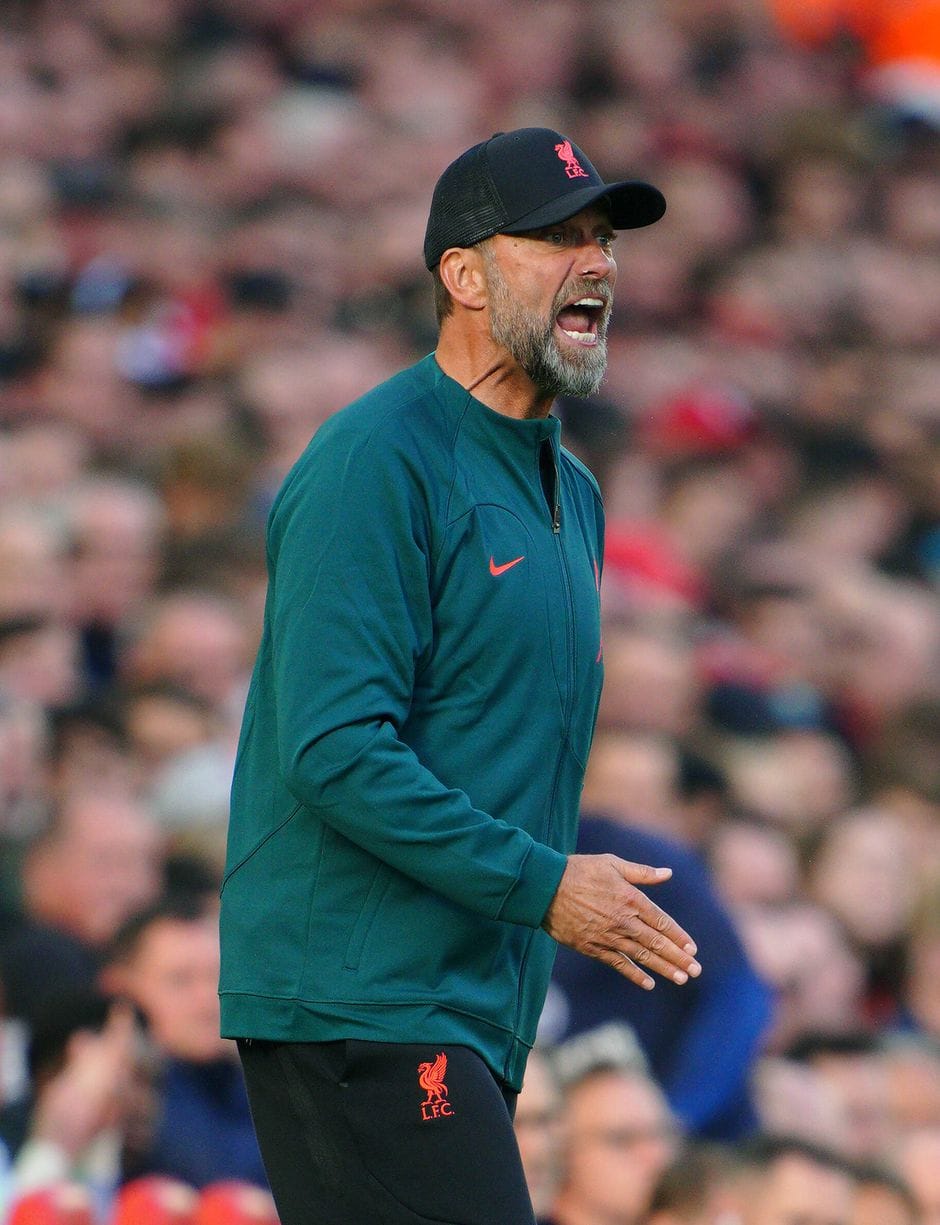
Jurgen Klopp gestures on the touchline during the Premier League match at Anfield, on October 1, 2022.
Klopp is often credited with pioneering the resurgence of Gegenpressing in modern football, and is regarded by fellow professional managers and players as one of the best managers in the world.
Klopp’s Gegenpressing is a tactic in which the team, after losing possession of the ball, immediately attempts to win back possession, rather than falling back to regroup.
Klopp has stated that a well-executed counter-pressing system can be more effective than any playmaker when it comes to creating chances.
Commenting on his pressing tactics, Klopp said:
“The best moment to win the ball is immediately after your team just lost it. The opponent is still looking for orientation where to pass the ball. He will have taken his eyes off the game to make his tackle or interception and he will have expended energy. Both make him vulnerable”.
Klopp’s Gengenpressing tactic requires great amounts of speed, organisation and stamina, with the idea of regaining possession of the ball as far up the pitch as possible to counter possible counter-attacks.
It also requires high levels of discipline as the team must be compact to close down spaces for the opponent to thread passes through, and must learn when to stop pressing to avoid exhaustion and protect from long balls passed into the space behind the pressing defence.
Despite Klopp’s pressing tactics resulting in a high attacking output, his Liverpool side was initially criticised at times for its inability to control games and keep clean sheets.
However, Klopp developed his tactics to control games and keep clean sheets.
However, Klopp developed his tactics to incorporate more possession based football and more midfield organisation, as well as overseeing the transfers of Alisson Becker, Virgil Van Dijk, Naby Keïta and Fabinho ahead of the 2018–19 season which saw Liverpool achieve their best league start in the club’s history, and equal the all-time record for the fewest goals conceded at the mid-point of a top-flight season, conceding just 7 goals and keeping 12 clean sheets.
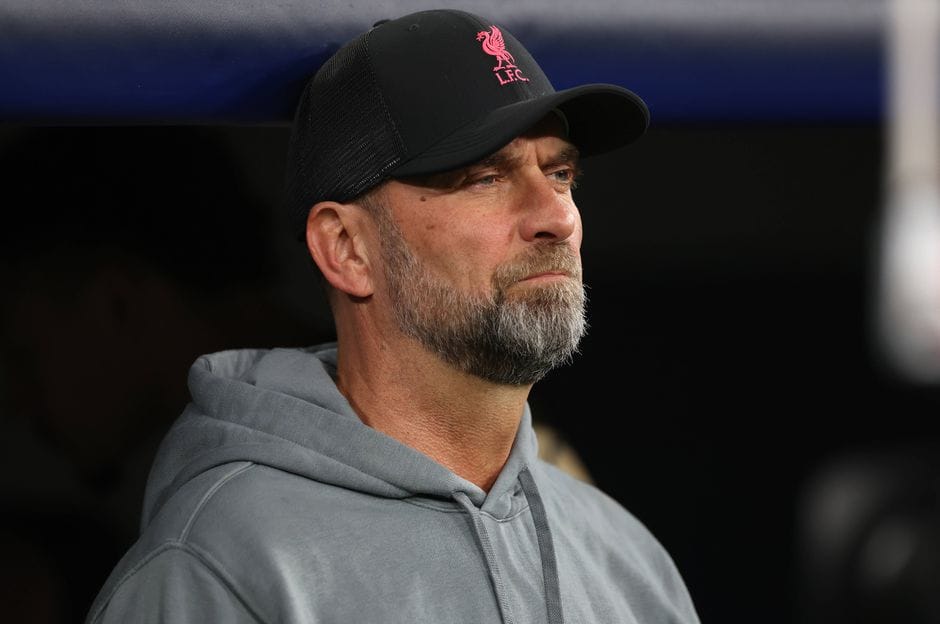
Jurgen Klopp is one of the highest-paid coaches in the world
In Klopp’s first two full seasons at Liverpool, Klopp almost exclusively employed a 4–3–3 formation, using a front three of wingers Mohamed Salah and Sadio Mané surrounding false-9 Roberto Firmino, supported by Philippe Coutinho in midfield.
The foursome earned the moniker of the ‘Fab Four’ as they supplied the majority of the team’s goals over this period of time.
Roberto Firmino’s exceptionally high number of tackles for a striker under Klopp’s management encapsulates his style of play, demanding a high-press from all his players and having his striker defend from the front.
Following Coutinho’s departure from the club in January 2018, the remaining front three increased their attacking output and continued to create chances as Salah won the Premier League Golden Boot in 2018,before sharing the award with his team-mate, Mané, in 2019.
In the early part of the 2018–19 season Klopp, at times, used the 4–2–3–1 formation, which he had previously used at Dortmund.
In 2016, Guardiola suggested that Klopp could be “the best manager in the world at creating teams who attack”.
Klopp has also received praise for building competitive teams without spending as much as many direct rivals, placing emphasis on sustainability over purely short-term success.
As well as receiving plaudits for his tactics, Klopp is also highly regarded as a motivator.
Jürgen Klopp Salary 2023
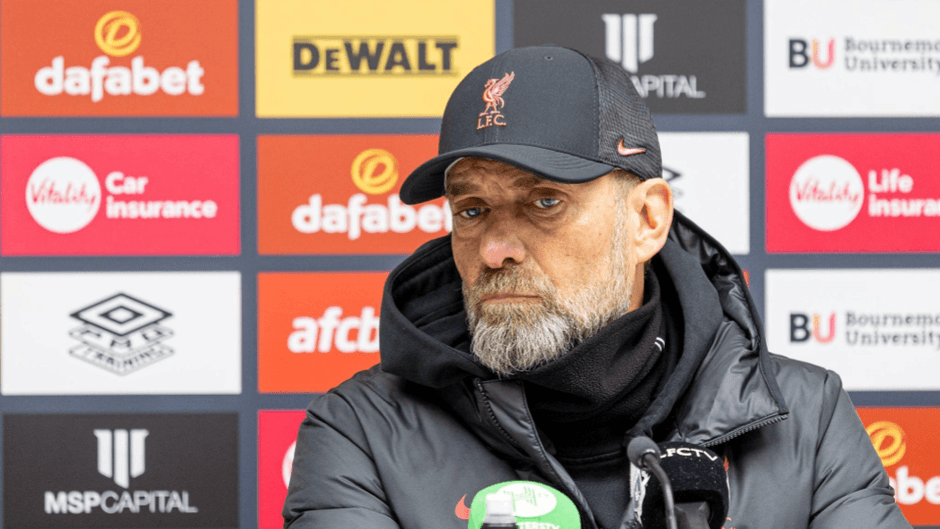
Liverpool manager Jurgen Klopp
As of September 2023, Jürgen Klopp is one of the highest-paid football managers in the world.
He is the second highest-paid coach in the Premier League with an annual paycheck of over $19 million.
Below are the details of Jürgen Klopp’s 2023 salary at Liverpool:
Annual: $19,370,094.00
Monthly: $1,614,174.50
Weekly: $372,501.81
Daily: $74,500.36
2. Pep Guardiola (Manchester City) – $23.6 million p/a
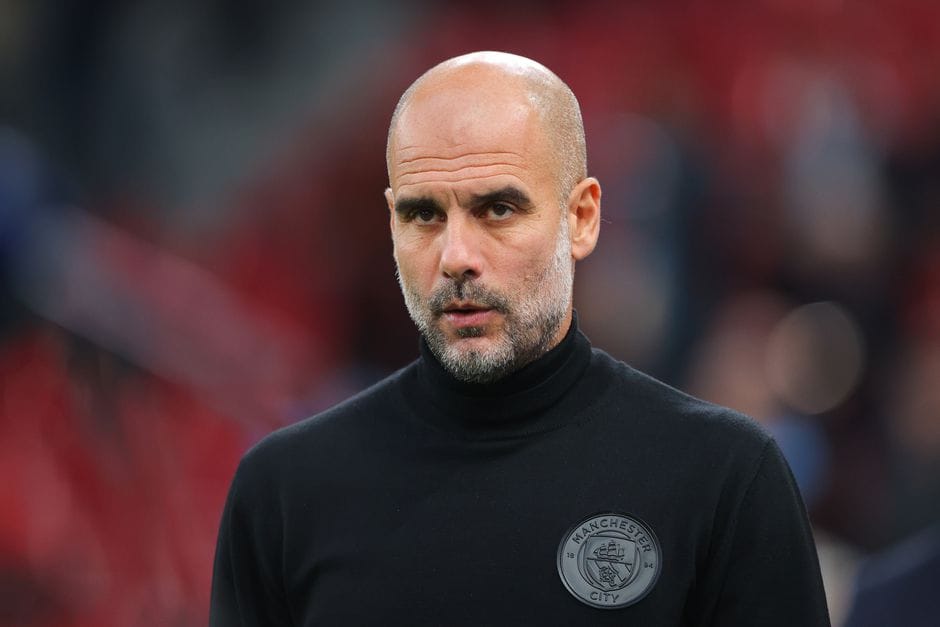
Pep Guardiola is one of the highest-paid football managers in the world
Josep “Pep” Guardiola Sala commonly known as Pep Guardiola is a 52-year-old Spanish professional football manager and former player, who is the current manager of Premier League club Manchester City.
Guardiola is one of the highest-paid football managers in the world.
He is considered one of the greatest managers of all time and holds the records for the most consecutive league games won in La Liga, the Bundesliga and the Premier League.
Guardiola was a defensive midfielder who usually played in a deep-lying playmaker’s role.
He spent the majority of his career with Barcelona, forming a part of Johan Cruyff’s Dream Team that won the club’s first European Cup in 1992, and four successive Spanish league titles from 1991 to 1994.
He captained the team from 1997 until his departure from the club in 2001.
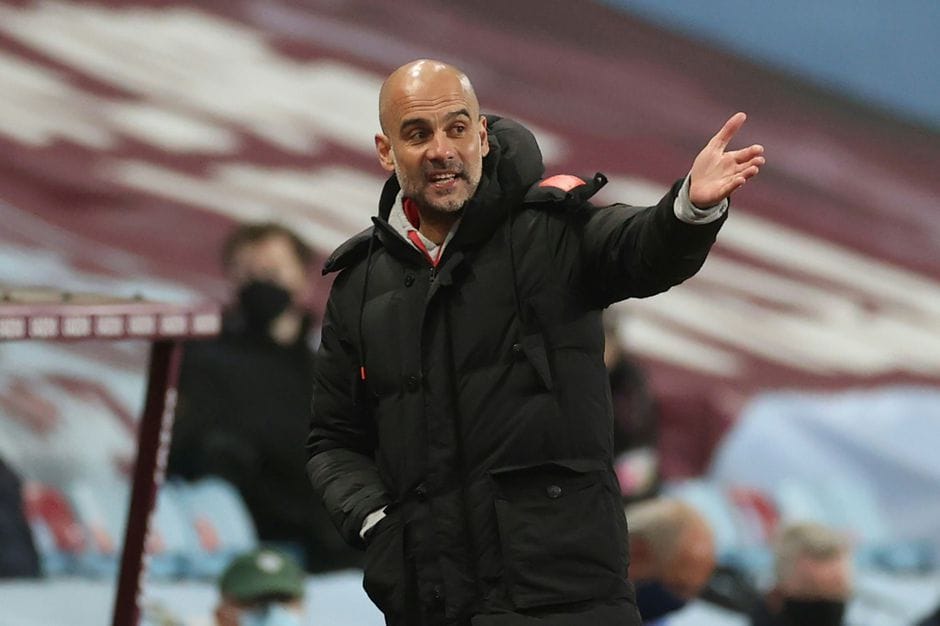
Manchester City manager Pep Guardiolais one of the highest-paid coaches in world football
Guardiola then had stints with Brescia and Roma in Italy, Al-Ahli in Qatar, and Dorados de Sinaloa in Mexico.
He was capped 47 times for the Spanish national team and appeared at the 1994 FIFA World Cup, as well as at UEFA Euro 2000.
He also played friendly matches for Catalonia.
After retiring as a player, Guardiola briefly coached Barcelona B, with whom he won a Tercera División title.
He took charge of the first-team in 2008.
In his first season, he led Barcelona to the treble of La Liga, Copa del Rey, and the UEFA Champions League, becoming the youngest manager to win the latter competition.
In 2011, after leading the club to another La Liga and Champions League double, Guardiola was awarded the Catalan Parliament’s Gold Medal, their highest honour.
The same year, he was also named the FIFA World Coach of the Year.

Pep Guardiola
He ended his four-year Barcelona stint in 2012 with 14 honours, a club record.
After a sabbatical period, Bayern Munich announced Guardiola would join the club as manager in 2013.
Guardiola won the Bundesliga in each of his three seasons as Bayern manager, including two domestic doubles.
He left the Bavarians for Manchester City in 2016, and guided them to a Premier League title in his second campaign in charge, breaking numerous domestic records as the team became the first to attain 100 league points.
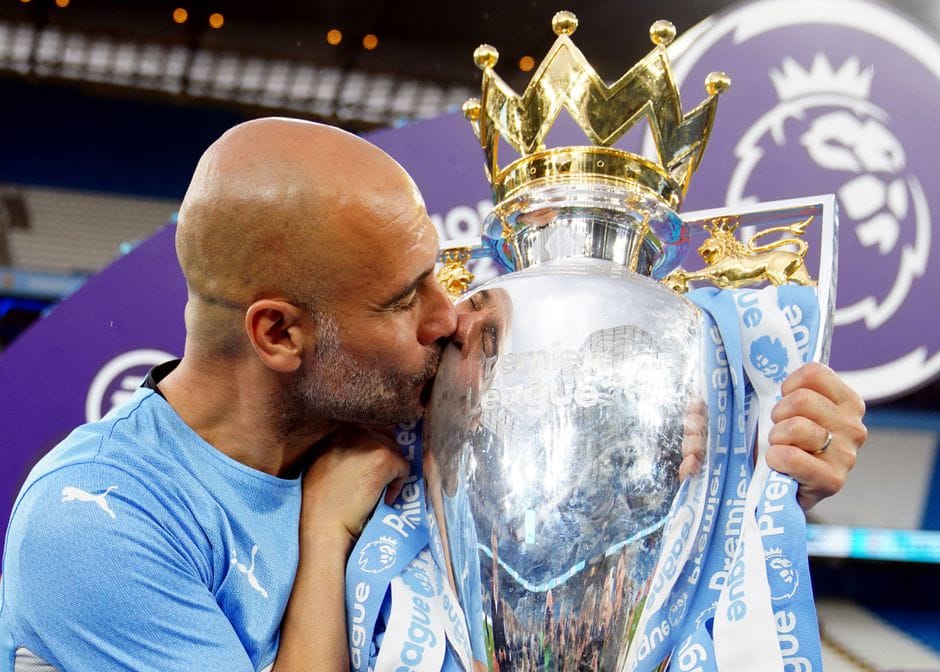
Pep Guardiola won his fifth Premier League trophy for a third consecutive season
To date, he has won five Premier League titles, four EFL Cups, and the FA Cup, including a domestic treble in the 2018–19 season.
He also led the club to their maiden UEFA Champions League Final in 2021, where they lost to Chelsea.
Pep Guardiola’s Coaching Style
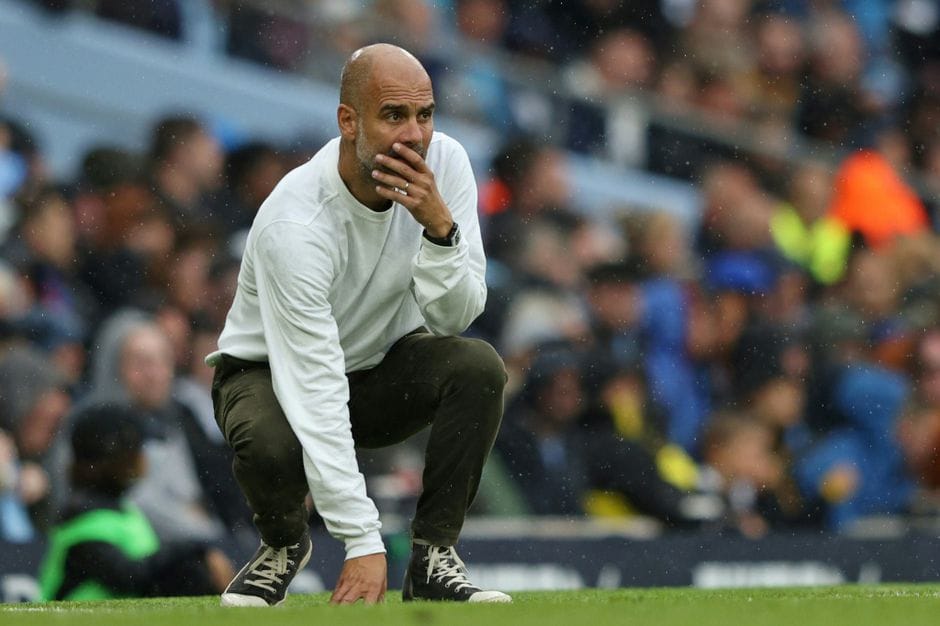
Manchester City manager Pep Guardiola
Under Guardiola’s predecessor Frank Rijkaard, Barcelona were known for a 4–3–3 with plenty of flair with Ronaldinho being the centre point of the attack.
However, under Guardiola, Barcelona became more disciplined with a greater focus on possession and a disciplined and aggressive pressing style.
The leader in defence was Rafael Márquez who created chances from the back with his long balls.
He often played a high defensive line with the full backs (particularly Dani Alves) pushing high up their respective sides while relying on the passing of Xavi and Andrés Iniesta to retain possession and employing a pressing style without the ball.
During striker Samuel Eto’o’s time at Barcelona, Lionel Messi was deployed on the right-hand side, though following his departure Messi largely played in the centre-forward role in a false nine capacity.
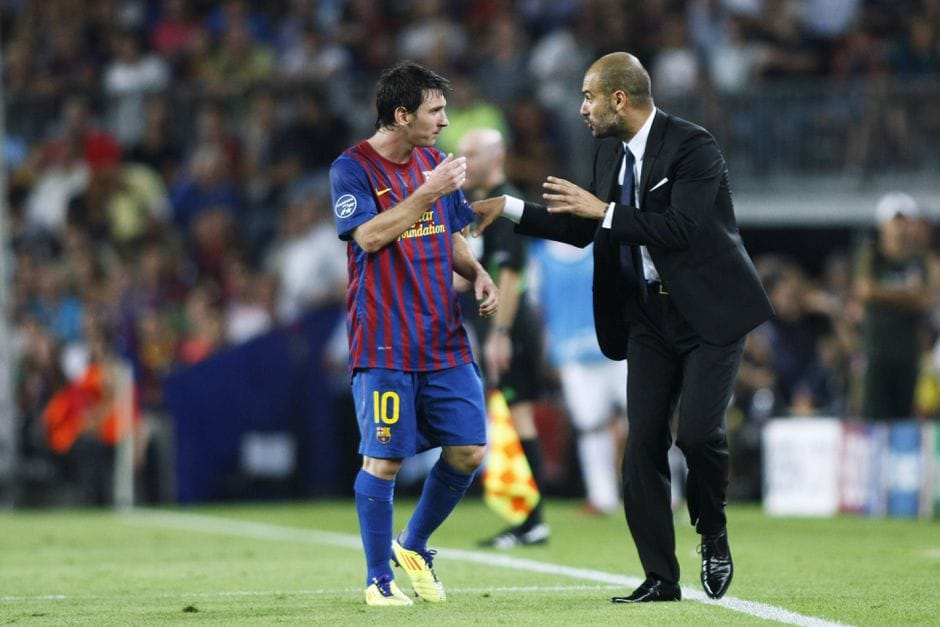
Guardiola and Messi at Barcelona
During the 2011–12 season, Guardiola made increasing use of the 3–4–3 system, especially when facing two attackers, using Cesc Fàbregas as an attacking midfielder and Sergio Busquets as a midfield pivot.
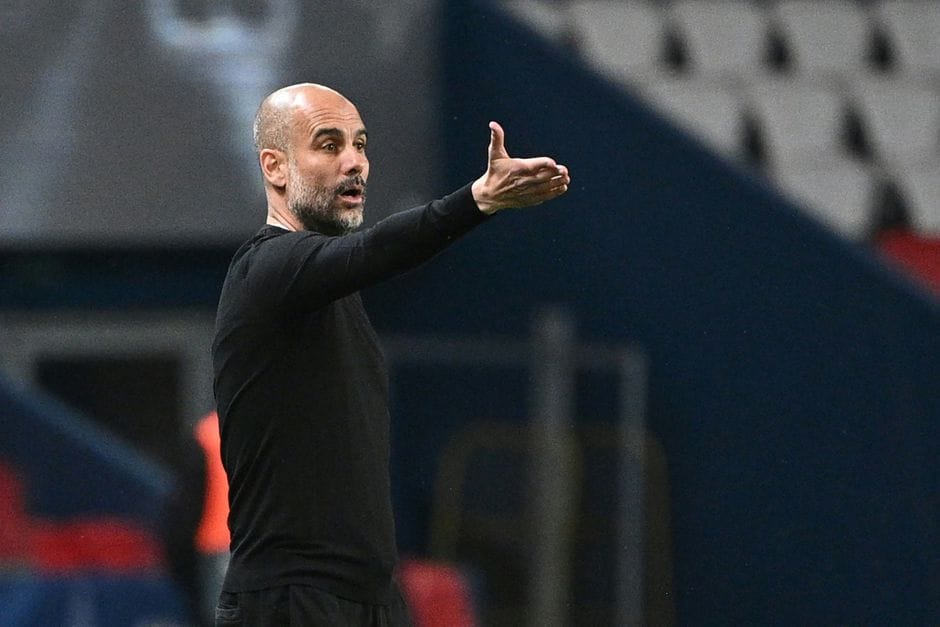
Pep Guardiola
Although much emphasis is placed on retaining possession of the ball and dictating play, with the intent to have the opposing side’s defence chase the ball for extended periods of play, Guardiola’s teams are recognised for pressing off the ball.
Players press and harry the opposition collectively in an attempt to win back possession of the ball. This collective press is only conducted in the starting third of the opposition’s pitch where less space exists and defenders and/or the goalkeeper may not be as good at dribbling or passing the ball as a midfielder.
At Barcelona, this was referred as the “six-second rule”, in that the team should aim to win back possession of the ball within six seconds as this was the time when opposition players are most susceptible to being dispossessed or forced into a mistake.
If possession of the ball was not won back within six seconds, players would abandon the collective press to conserve energy and revert to compact positions with men behind the ball to make it hard for the opposition to break down.
The ‘six-second rule’ has largely been omitted after he left Barcelona.
However, the principle of swiftly winning the ball back following a turnover of possession remains at Bayern Munich and Manchester City.
As high pressing became prominent, Guardiola sought to counteract it with goalkeepers and defenders comfortable with both long and short ball distribution.
At Manchester City, Ederson routinely played accurate long balls up-field when City were pressed high, at times taking the entire opposition out-of-play, creating 1-on-1 situations for City forwards.
Over the years, Gairdiola’s tactical approach has also vastly evolved.
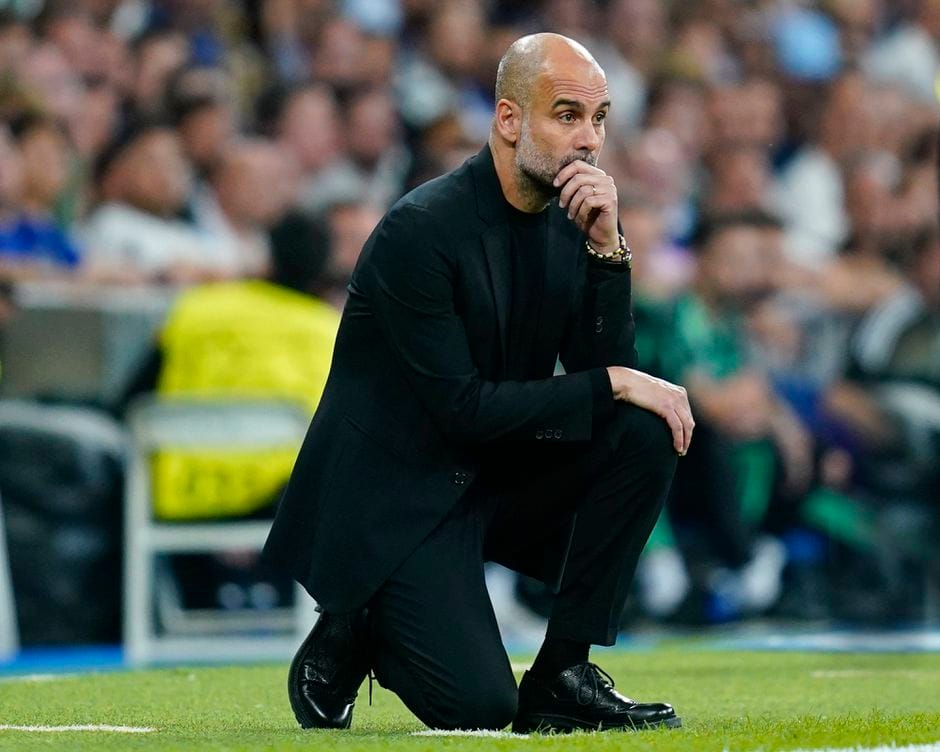
Pep Guardiola is chasing his first Champions League trophy since 2011
Guardiola became more synonymous with possession-based, attacking football, with defenders along with the goalkeeper playing it out from the back.
In one of Guardiola’s editorials, he called Zinedine Zidane France’s best defender, pointing out how recycling possession in itself is a key defensive tactic, something that Guardiola teams would later become synonymous with.
Considered by many pundits to be one of the greatest managers of all time, Guardiola is often linked with the successes of the Spanish and German national teams in 2010s, both of whom had many first-team players that were coached by him.
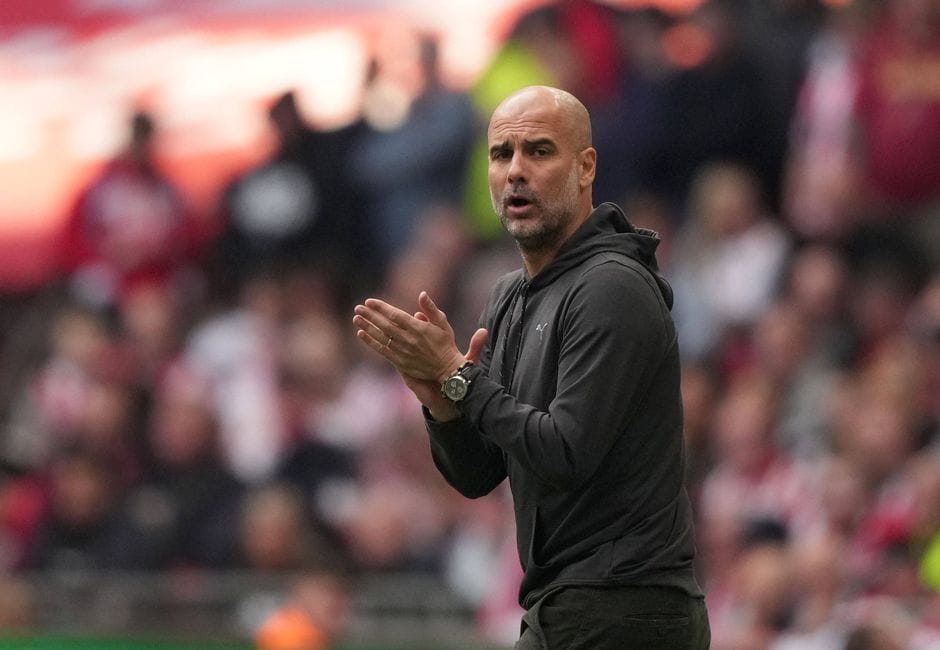
Pep Guardiola is widely considered as one of the greatest football managers of all time
Tactics employed by Guardiola has been likened to Gegenpressing invented by Ralf Rangnick and used to great effect by Jürgen Klopp, which has influenced approaches of managers such as Maurizio Sarri, Thomas Tuchel, Graham Potter, and Luis Enrique.
However, Guardiola’s obsessive preparation, and fixation on what his opponents might do, have been blamed for some key defeats with Bayern Munich and Manchester City in the Champions League, a trophy he has found hard to come by for a decade since 2011.
Pep Guardiola Salary 2023
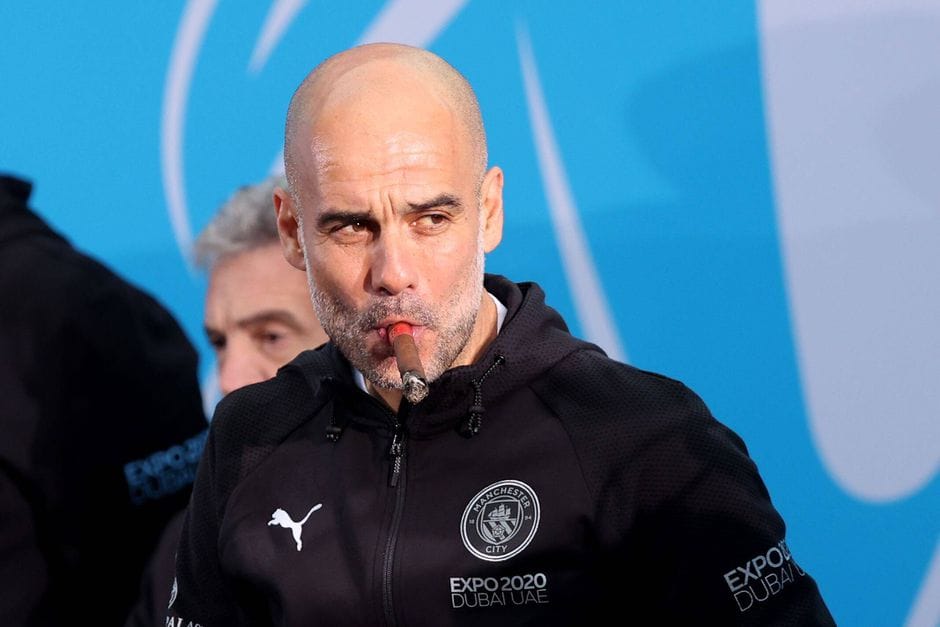
Pep Guardiola is the highest-paid coach in the Premier League
As of September 2023, Pep Guardiola is one of the highest-paid football managers in the world.
He is the highest-paid coach in the Premier League with an annual paycheck of over $23 million.
Below are the details of Pep Guardiola’s 2023 salary at Manchester City:
Annual: $23,607,302.00
Monthly: $1,967,275.17
Weekly: $453,986.58
Daily: $90,797.32
1. Diego Simeone (Atletico Madrid) – $42.4 million p/a

Atletico de Madrid head coach Diego Pablo Cholo Simeone is the highest-paid football manager in the world
Diego Pablo Simeone González commonly known as Diego Simeone and nicknamed “El Cholo” is a 53-year-old Argentine professional football manager and former player who played as a midfielder.
He has been the manager of Atlético Madrid since December 2011.
He is renowned in modern football for his attention to detail and man-management skills.
As of September 2023, Diego Simeone is the no.1 highest-paid football manager in the world.
In his club career that started in 1987, Simeone played in Argentina, Italy, and Spain for Vélez Sarsfield, Pisa, Sevilla, Atlético Madrid, Inter Milan, Lazio, and Racing Club.
He won a domestic double with Atlético Madrid in 1996, and the UEFA Cup with Inter in 1998, also winning another domestic double with Lazio in 2000, as well as the 1999 UEFA Super Cup and the 2000 Supercoppa Italiana.
Simeone was capped over 100 times for the Argentina national team and represented the country at the 1994, 1998, and 2002 FIFA World Cups, and in four editions of the Copa América, winning the tournament in 1991 and 1993.
He also won the King Fahd Cup in 1992, the 1993 Artemio Franchi Cup, and a silver medal at the 1996 Summer Olympic games.
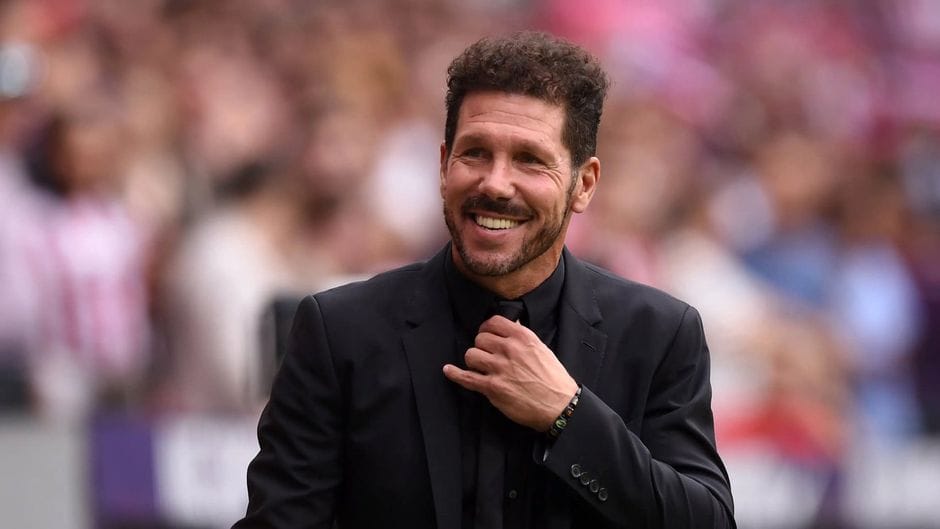
Diego Simeone is the highest-paid coach in world football
As a manager, Simeone has coached Argentine sides Racing Club, Estudiantes de La Plata, River Plate, San Lorenzo and Italian club Catania before joining Spanish club Atlético Madrid in 2011.
He won the Argentine Primera División both with Estudiantes and River Plate and has had his biggest managerial success with Atlético Madrid, winning La Liga twice, the Copa del Rey, two UEFA Europa Leagues, two UEFA Super Cups, as well as being runner-up of the UEFA Champions League twice.
Simeone is the longest-serving manager in La Liga, having stayed over a decade at Atlético.
Diego Simeone Coaching Style
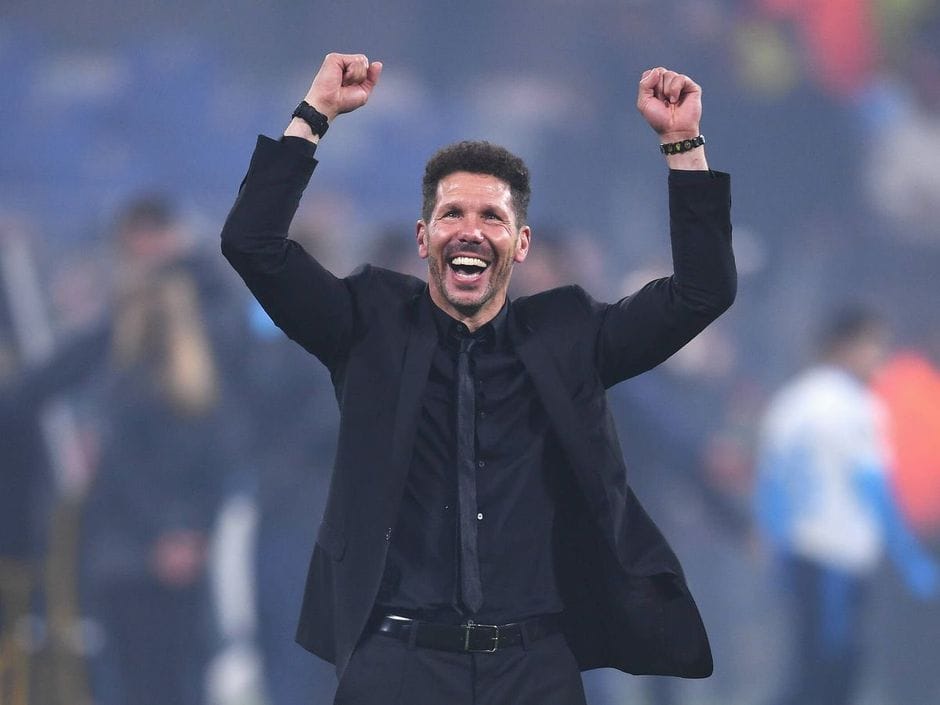
Diego Simeone of Atletico Madrid
Simeone’s preferred formation is the 4–4–2, which he first practised when he was manager of Estudiantes de la Plata in 2006.
In this formation, the two wingers move inside and act like attacking midfielders, creating space for the full backs and fluidity in the attack, effectively being a 4–2–2–2 when the team is on the offensive.
The two holding midfielders provide the defensive muscle needed to win midfield battles. Utilizing this formation, Simeone’s Estudiantes won the 2006 Apertura by beating Boca Juniors 2–1 while being down to ten men from the first half.
It is essentially this formation that Simeone also utilizes at Atlético Madrid.
A common feature of Simeone’s teams is defensive compactness and quick counter-attacks.
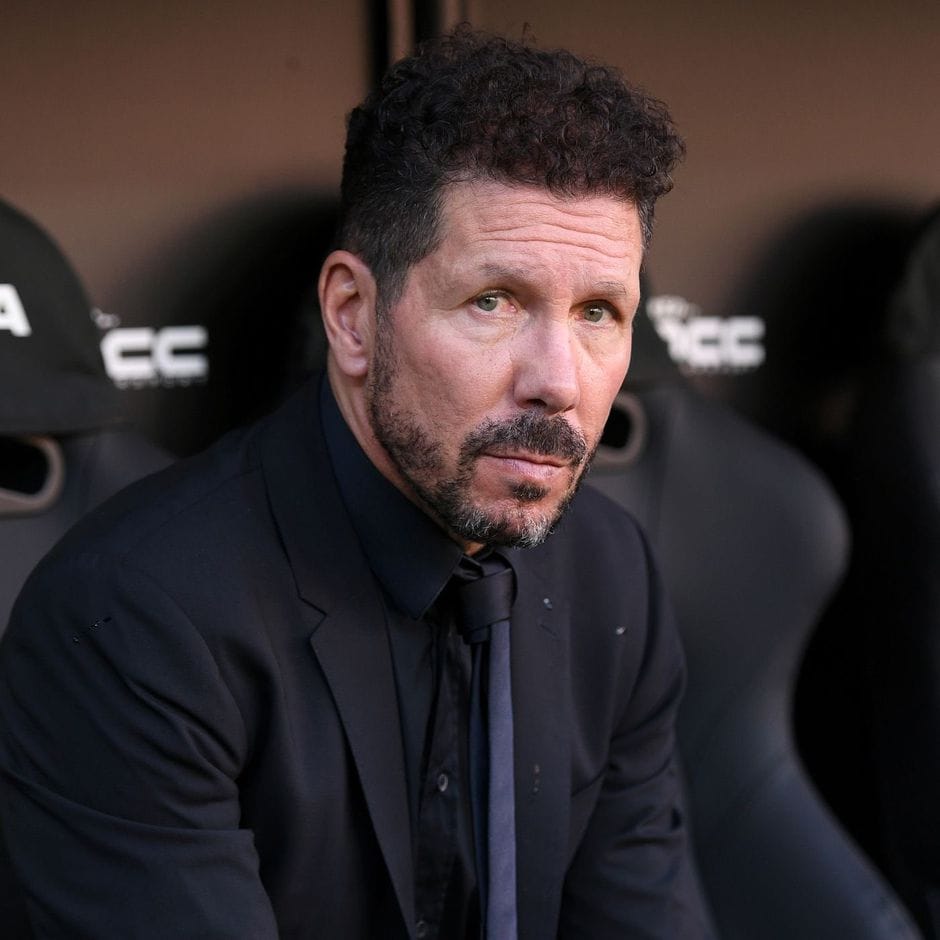
Diego Simeone of Atletico Madrid
Their defending consists of two stages: deep defending in their own defensive third in a narrow 4–4–2 consisting of two closely connected defensive lines of four players, and counter-pressing in their opponents’ third to win the ball high up the pitch.
When the ball is won, the team attack as a unit, deploying their fluid 4–2–2–2 formation, with the forwards often shifting to the flanks to create even more space.
In defense, the key idea is to force opponents into wide areas, gain numerical dominance in the ball’s zone and steal the ball or force the opponent into a backward pass.
Counter-pressing consists of reducing an opposing team’s space, disrupting their build-up and reducing the number of “safe” positions for opponents’ movement on the pitch, thus eliminating goal threats.
Simeone is also renowned for his attention to detail and quick adaptability to a game’s changing situations.
During his time as manager of Atlético Madrid, he has placed emphasis on creating chances from set-pieces, while not allowing the opponent to create chances from set-pieces.
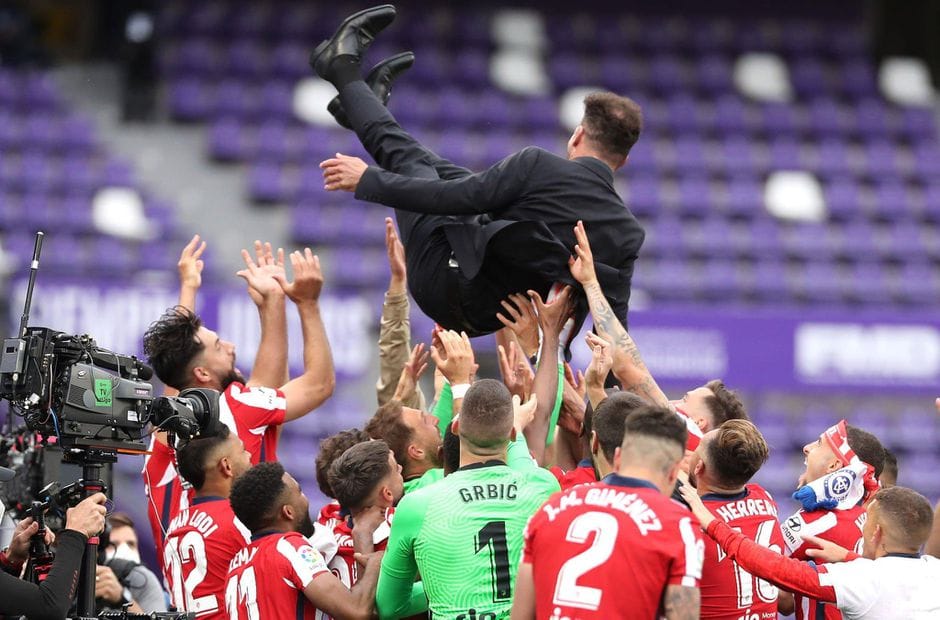
Diego Simeone won the 2020/21 LaLiga title with Atletico Madrid
Several important goals, including the one that gave Atlético the 2014 La Liga title, have been scored from set-pieces.
While his teams aren’t known for controlling possession, they are lauded for controlling the pace and space in which a game is played.
Simeone has also been known to be quick in making tactical changes to influence a game’s outcome.
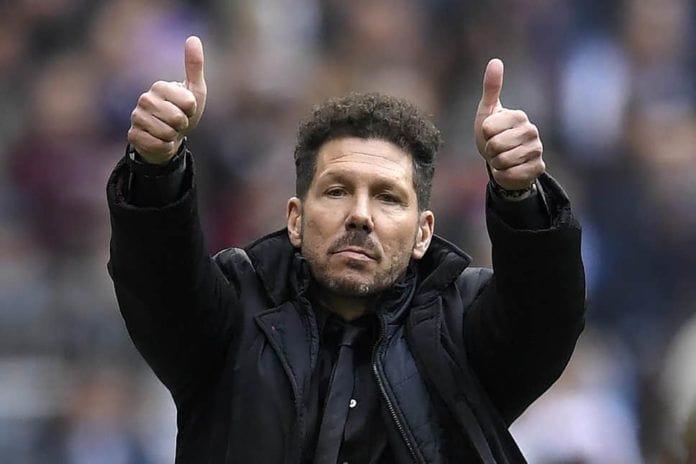
Diego Simeone of Atletico Madrid
Simeone has also earned praise for instilling confidence and discipline in his players, which has helped his teams emerge victorious under adverse conditions.
In the 2020–21 season, amid COVID-19 and injury crisis among the team’s forwards, Simeone experimented with back three formations, such as 5–3–2 and 3–5–2.
This saw them adapt to a new, more possession-heavy style, averaging the majority of possession over the season for the first time since their victorious 2013–14 season.
Recently, Simeone’s team has also been known to create chances and take on a more offensive approach.
Diego Simeone Salary 2023
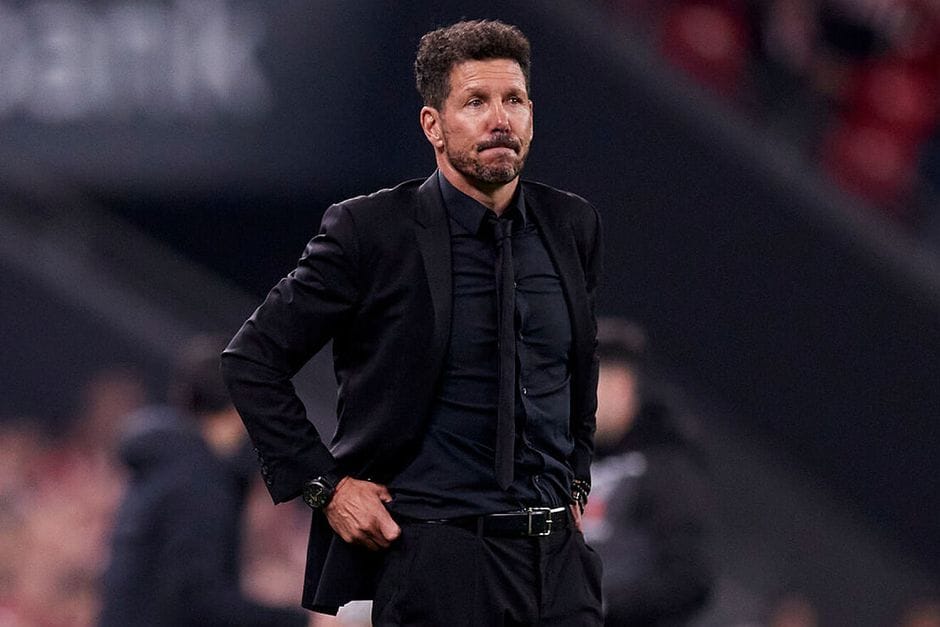
Diego Simeone is the highest-paid football manager in the world
As of September 2023, Diego Simeon is the highest-paid football manager in the world.
He is also the highest-paid coach in LaLiga with an annual paycheck of over $42 million.
Below are the details of Diego Simeone’s 2023 salary at Atletico Madrid:
Annual: $42,406,870.00
Monthly: $3,533,905.83
Weekly: $815,516.73
Daily: $163,103.35
Pulsesports.ng
